#girl freiberg
Explore tagged Tumblr posts
Photo
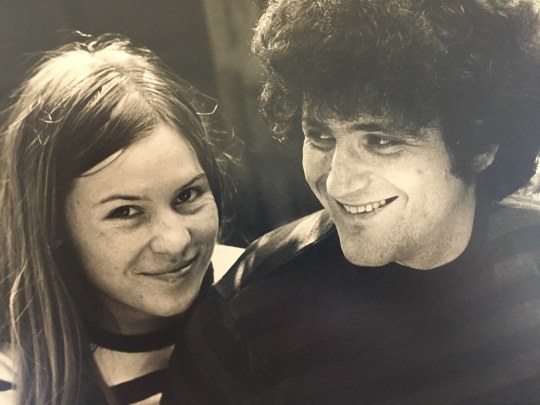
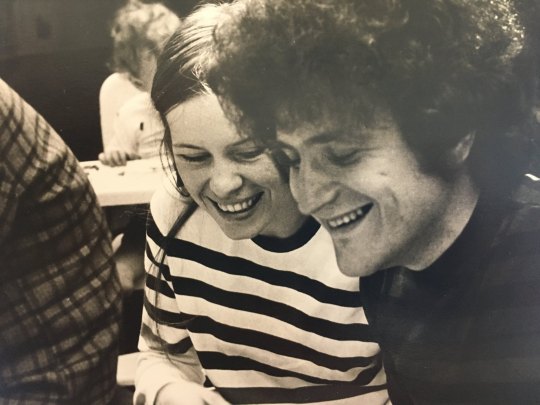
Julia Dreyer-Brigden (aka, Girl Freiberg) and David Freiberg photographed by Jim Marshall, July 1968
#girl freiberg#julia dreyer#julia brigden#david freiberg#jim marshall#groupies#quicksilver messenger service#jefferson starship#classic rock#the girl with no name#girl from mill valley#light your windows#and the bagillion other songs she inspired#faves
20 notes
·
View notes
Text
[Trigger Warning] ELVIS MEETING HIS FANS, WITH A GUN BEHIND HIS BACK: TRUE OR FALSE? (July, 1972)
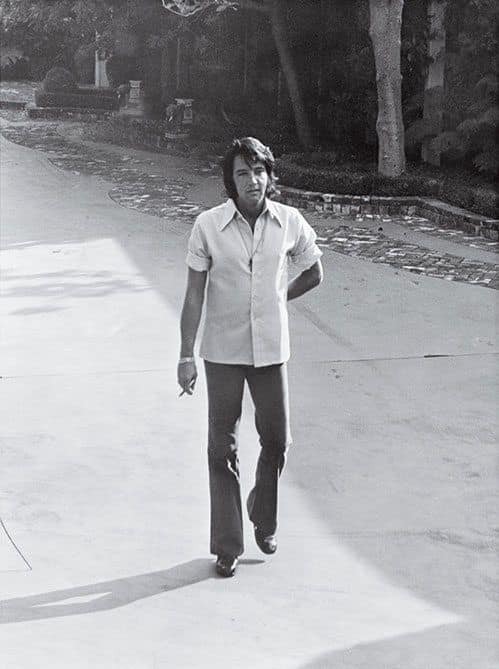
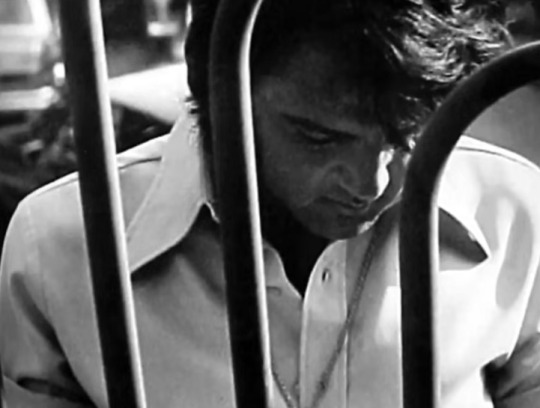

July, 1972 on Elvis' Beverly Hills home, 1174 Hillcrest Drive.
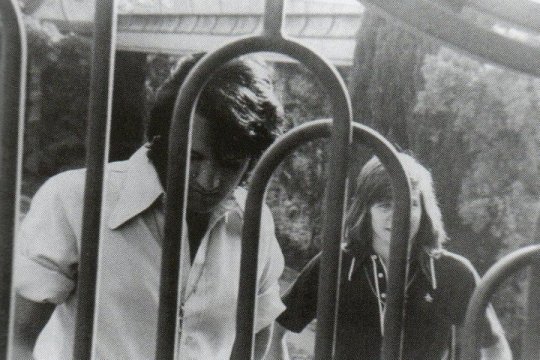
INTRODUCTION: Some things need to be clear beforehand. Elvis was threatened quite a few times over the years, specially since he began performing live on stage again, in 1969. Death threats were sent his way occasionally. Whether the threats were intentional or just a way of messing up with a famous person, some of those sounded pretty serious, thus not only Presley's personal security men or the local police department, even the FBI worked in investigating some of those incidents. Things got to a point when there were moments the threats warned about bombs being placed at his concert sites at the same day a show about to take place. Nothing came out of any of those threats, fortunately but, once those things happened, naturally Elvis was concerned for his life, therefore he was absolutely entitled to carry a gun, out of precaution, safety, "just in case" situation. It's fair to mention the Manson murders had only taken place a few years earlier (August, 1969) and, as we all know, actress Sharon Tate and her friends were murdered inside her home, tragically, which happened to be at Elvis' Beverly Hills neighborhood, so, yes, Elvis Presley was usually carrying a gun throughout the 70s, often, if not all times.
------------------------------------------------------------------------------------------------
Now, where this story on that one specific picture came from? Elvis' stepbrother, Billy Stanley. Billy is standing behind Elvis on the picture above.
Fans discuss Elvis' personal life over and over - and almost nothing can possibly come to conclusion because we weren't there to witness anything and some of the sources the stories come from are not so reliable as they seem to be, but still it's fun to collect different accounts on things that happened in the King' life. On January 10th, 2024, a fan shared the first picture (on top of this post, Elvis walking alone towards his gate with the left hand behind his back) on a Facebook fanpage. The fans passionately discussed the "gun" rumor. Pamela Freiberg, owner and administrator for "Elvis in the 70s" Facebook group, directly asked Billy about this "rumor" that was published in books and articles over the years, and he confirmed the story to her.
Pamela's comment on the group was: "Billy wrote to me ... here are the words .... 'There's actually a series of photos from this day. I was outside and saw a guy that was trying to look like Elvis. When I saw him, I thought Elvis would get a kick out of this. So, I went inside and told him about the guy. Elvis picked up his pistol and we walked to the gate. He didn't want anyone to see the gun, so he put it behind his back. As we were walking toward the gate, he motioned for me to take the gun, which I did and tucked it behind me in my jeans.'"
Some believe him, some not. One can wonder 'why Elvis would have his left hand on the gun, when he was right handed?', for instance.
Sandi Miller, one of the most recognized Elvis fans, who met Elvis in the 60s and today calls herself a "gate girl", — those passionate fans who met Elvis by standing at the gates of his homes, waiting for him to come outside, whenever he was there, to talk to them, something he would do frequently — who even was (to a certain extent) very close to Elvis, a friend even, since she dated Charlie Hodge for a time, was there that day on July, 1972. She commented on the thread in that one Facebook group too, trying to defend Elvis. She said, "He did not have a gun in his hand!! He often carried guns but not always and not usually when he would come out to visit with fans...more likely that he'd have his little derringer In his boot."
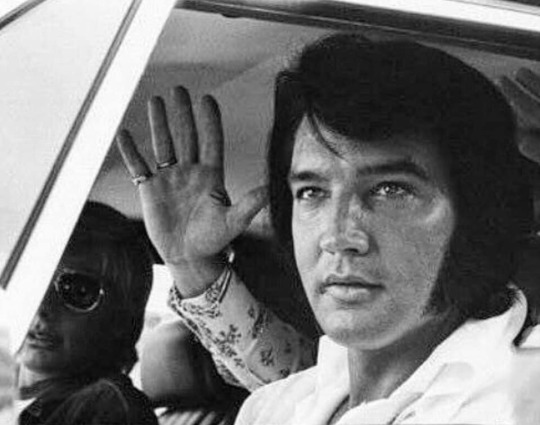
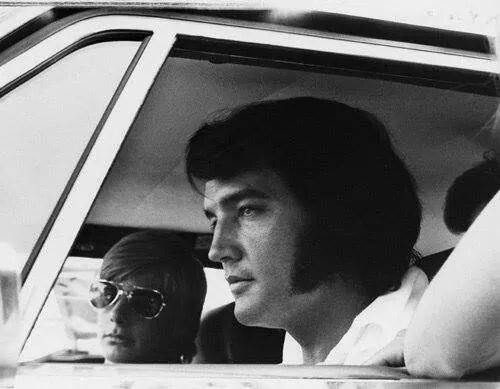
Elvis, July, 1972. Sandi Miller: "Same day but after he visited with everyone…then he and the brothers got in the car and left - he stopped again when he came back also."
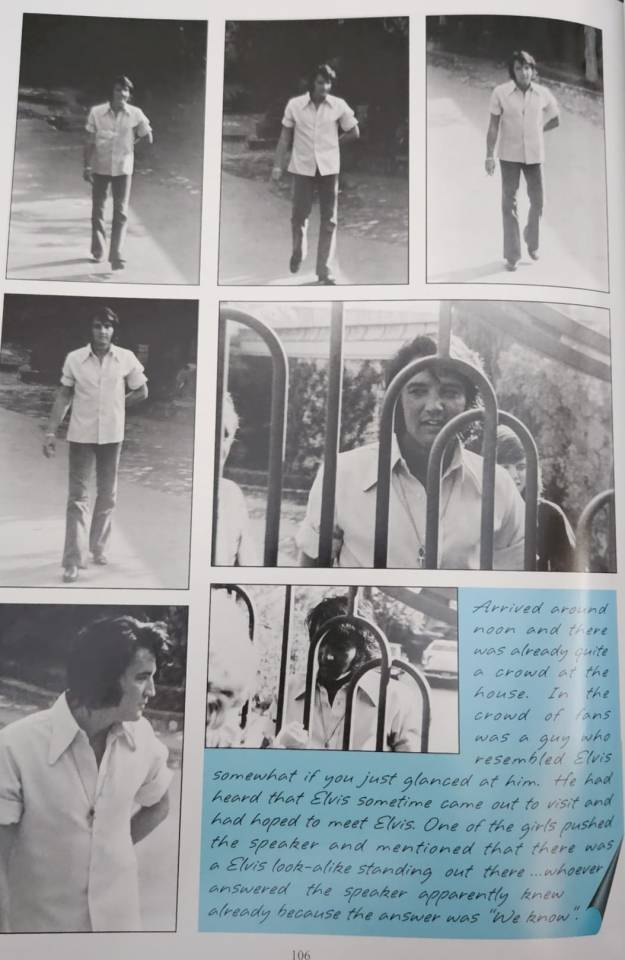
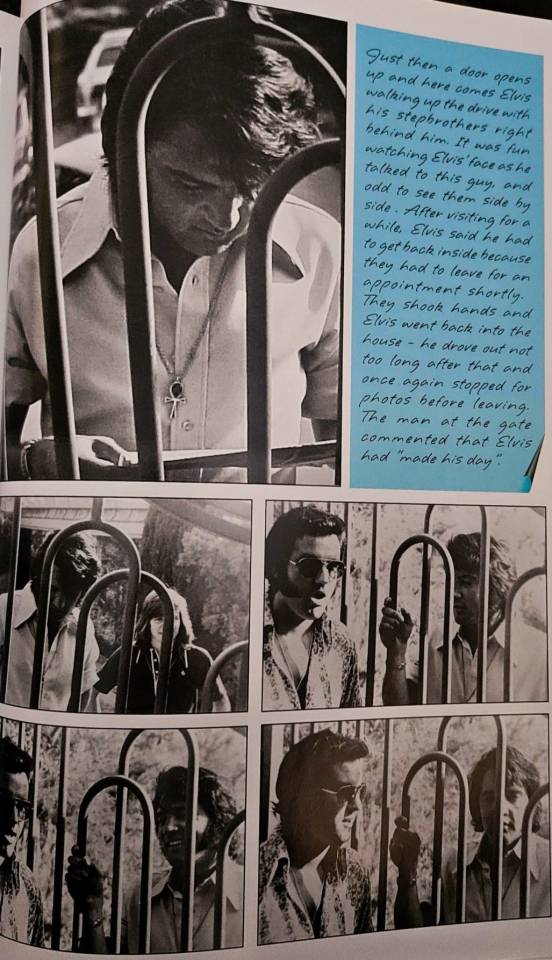
— Sandi Miller's accounts on this July, 1972, moment. Those pages comes from the book "Elvis - Behind the Image" by Bud Glass. I do not know if it's the Vol. 1 or Vol. 2, tho. Excerpts from Sandi Miller's journals, where she wrote down details of the meetings with Elvis in the 60s and 70s, were used to both volumes of "Behind the Image" publications. Many candid pictures in those books are also hers. By the way, many of the candid pictures of Elvis in his gates we see around the internet were actually taken by Sandi.
Arrived around noon and there was already quite a crowd at the house. In the crowd of fans was a guy that resembled Elvis somewhat in you just glanced at him. He had heard that Elvis sometime came out to visit and had hoped to meet Elvis. One of the girls (fans) pushed the speaker and mentioned that there was an Elvis look-alike standing out there.... whoever answered the speaker apparently knew already because the answer was "We know". Just then a door opens up and there comes Elvis walking up the drive with his stepbrothers right behind him. It was fun watching Elvis' face as he talked to this guy, and add to see them side by side. After visiting for a while, Elvis said he had to get back inside because they had to leave for an appointment shortly. They shook hands and Elvis went back into the house - he drove out not too long after and once again stopped for photos before leaving. The man at the gate commented that Elvis had "made his day".
Personally, I don't see the fuss about this. I believe Billy. I believe Elvis was carrying a gun indeed, but he obviously didn't intend on using it unless he felt threatened, and we know stories about passionate fans who lashed out their idols, some even murdered them in fact (John Lennon was one of the icons, assassinated by a passionate fan). There's plenty of those stories. Let's just imagine ourselves as famous people. We hear there's someone trying to look like you, standing outside your house. Wouldn't you felt at least a little bit uneasy? I know I would never walk out there by myself. Elvis was curious if the guy indeed looked like him or not, maybe even because he had a twin brother who died at birth, Jesse Presley, so if I was him I would've been dying to see this look-alike person, but I would've been careful about meeting him too. You never know.
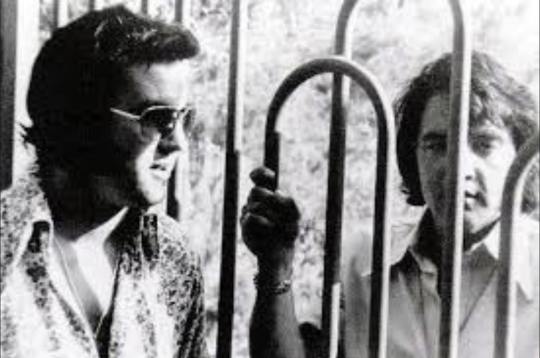
Elvis and his look-alike fan, Larry Blong. July, 1972, Beverly Hills, CA.
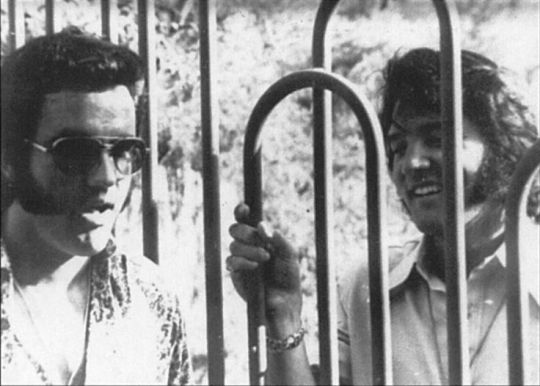
Fortunately, things went smoothly. Elvis saw the guy, shook hands, and the fan had the time of his life meeting his idol. That is all we need to care about. ♥
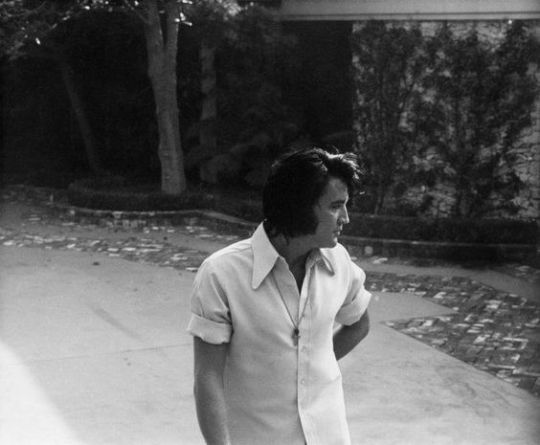

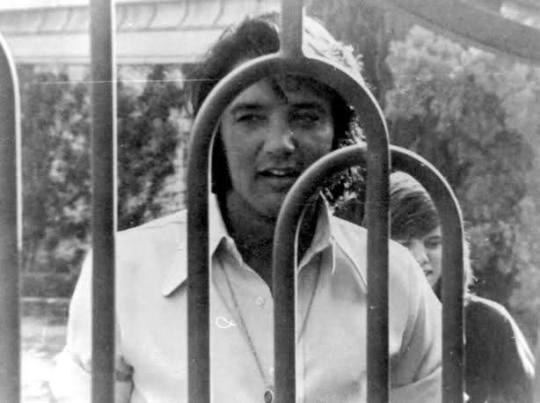
#elvis presley#elvis#elvis the king#elvis fans#elvis fandom#elvis history#70s elvis#1972#1972 Elvis#elvis story#true or false
61 notes
·
View notes
Text
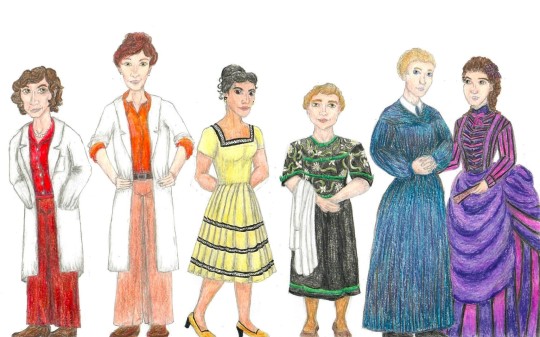
What, you thought I'd let another Pride month pass by without uploading a colorful drawing? Hah! Bamboozled! ...The last few hours of Pride are still Pride, alright? And proud I shall be!
I challenged myself to redo an older picture with my current skilly level - this is from 2021, I think?
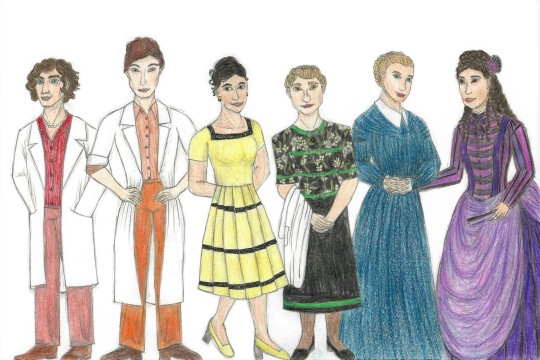
Honestly, I'm quite happy with how this turned out! I think the clothes are a lot better, although I still can't draw shoes / feet from a frontal view XD They aren't standing quite so stiff (and lopsided) anymore, the postures are better and, I like to think, the faces are better, too. At least they look a bit less doll-like, although I'm still not sure you'd recognize the Charité actresses form my drawing...
❤️ Inge Rapoport as played by Nina Kunzendorf (I like to think she's an ally to those two baby gay girls from her season's last episode who had been broken up by The Wall)
🧡 Margot Sauerbruch as played by Luise Wolfram (not officially a queer character, but it's very easy to see flirty undertones between her and Maria Fritsch; also I will never forgive them for dyeing her hair)
💛 Nurse Ariana as played by Patricia Meeden (despite them doing her dirty and writing her as a stereotype, I wound up liking her better than the season's main girl, so whatever; also the actress has glorious curls irl)
💚 Anni Marquardt Waldhausen as played by Mala Emde (I'm not sure why I think of this as Anni's "green dress"; it's very obviously black with a few green ribbons, but anyway, Anni has my favorite character arc among all the female main protagonists of the separate seasons)
💙 Sister Therese as played by Klara Deutschmann (finally a canon queer character! my darling, whom they've also done dirty, but all the more love to her here)
💜 Hedwig Freiberg as played by Emilia Schüle (am I the only one who thinks she's flirting with Ida all the time? considering her taste in men, that would've been the better choice...)
I've considered adding in 4th season characters, since Julia and Maral are out and married and all that, but honestly, Maral is a questionable doctor and a rather lousy wife, and Julia deserves better, so, no 4th season rep here.
This was not the best June I've ever had; I'm not in the best place. But I'm still here, still alive, still proud. And I intend to keep it that way.
4 notes
·
View notes
Text
Freiberg's disease: when a teenager's foot hurts
Freiberg's disease is a condition that mainly affects adolescent girls and is characterised by necrosis (death) of the head of the second metatarsal, the bone beneath the second toe.

What are the symptoms?
- Pain in the front of the foot, often felt when walking.
- Swelling and redness may occur.
- Lameness.
How can the diagnosis be confirmed?
X-rays can show the characteristic lesions on the head of the second metatarsal.
What is the treatment?
- Conservative treatment: Rest, ice, painkillers, orthopaedic insoles to relieve the painful area.
- Surgical treatment: Considered in the most serious cases, when the lesions are significant and conservative treatment is not effective.
Why does this condition mainly affect teenage girls?
The exact reasons are not yet fully understood, but hormonal and mechanical factors may be involved.
Go further
#paediatrics#pedorthology#orthopaedics#iefreiberg#metatarsus#feet#adolescent#medicine#sport#radiology
0 notes
Photo
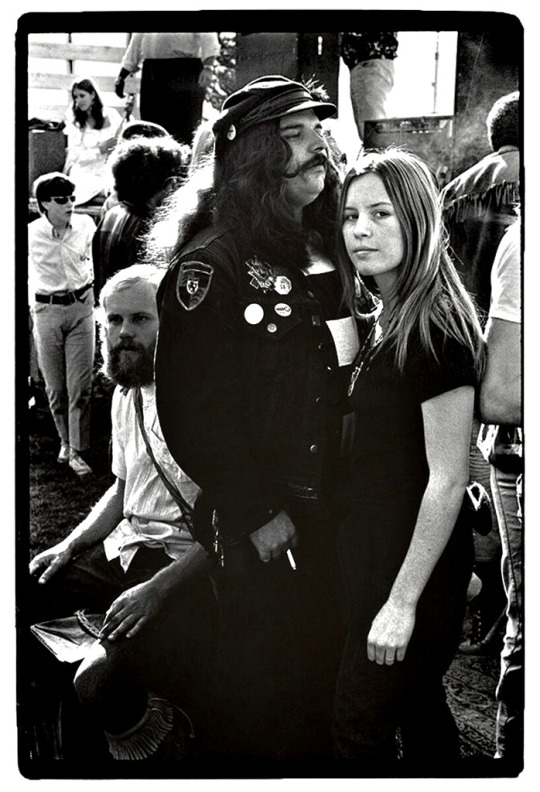
Pigpen and a friend (Girl Freiberg) on a quiet afternoon in San Francisco in 1967. Photo by William Gedney.
#rock photography#Grateful Dead#san francisco sound#hippies#1967#1960s#ronald mckernan#girl freiberg
160 notes
·
View notes
Photo

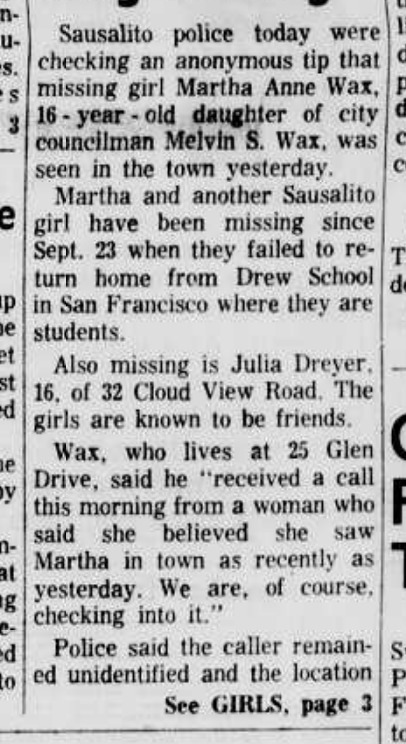
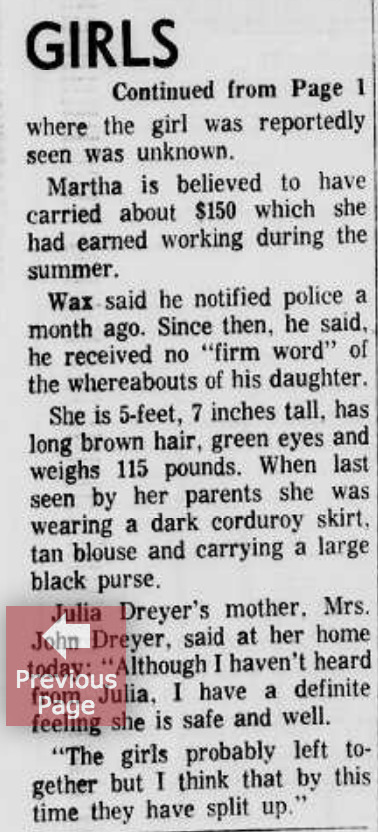
martha wax in sausalito ? - san rafael daily independent journal, october 23, 1965
so, here’s the thing.
my original plan for kicking off this blog was with a writeup about martha wax - a friend of paul kantner’s & the subject of the song martha from jefferson airplane’s 1967 ode to the summer of love, after bathing at baxter’s. she is a figure that has mystified me for years & is interesting in that, unlike a lot of “groupies” and “muses” of the day, there is very little written about her, outside of kantner’s dreamy, psychedelic love song.
what is written about her comes few and far between, usually in the form of throwaway sentences from books or articles about quicksilver messenger service and the grateful dead (& the airplane too, of course): “martha was with david crosby then,” “martha introduced skip spence to the jefferson airplane,” “martha ran away with girl freiberg,” et cetera, et cetera.
a picture of her life as a young runaway does start to appear provided you can cobble enough of the pieces together, but they’re difficult to find. what i’m saying is: i have my work cut out for me.
i’ll have some smaller (& perhaps more easily accessible) pieces coming soon while i chip away at the mystery of this rock & roll white whale, but in the mean time have this excerpt from a san rafael newspaper about the first time martha (and julia “girl” dreyer) ran away from home.
i apologize for the crappy quality of the screenshots, but this was the first time i’d ever seen this and i am blown away.
11 notes
·
View notes
Text
Since you all enjoyed my last video of Colibri napping with me so much, have another one 🥰
#yes this is a somewhat regular occurrence#she is the sweetest girl#sleepy pony#sleepy horse#horse#horses#horse riding#horses of tumblr#equine#equestrian#freiberger#fribi#franches montagnes#horse video#equestrian video#mystuff#colibri#videos#myface#nap time with colibri
92 notes
·
View notes
Text
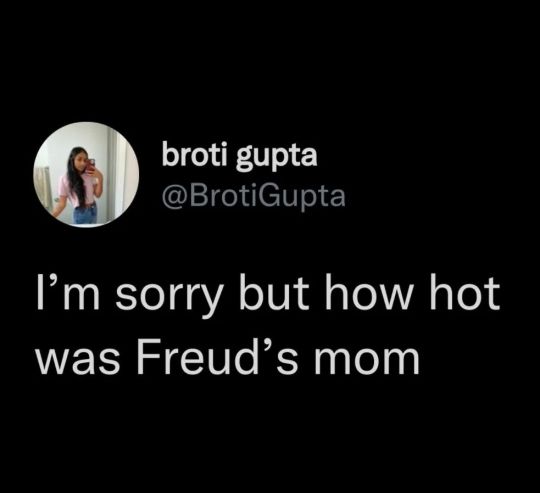
This girl is right: Freud's mom was a hottie!
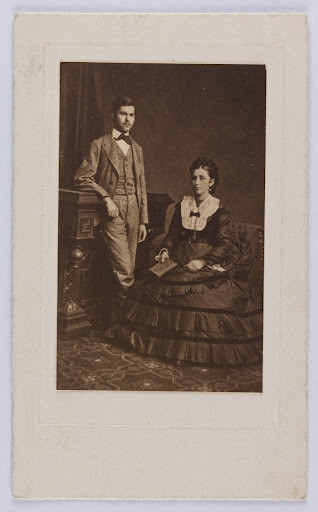
Sigmund Freud (aged 16) and his mother, Amalia, in 1872
More about Oedipus complex:
Who were Freud's parents?
Freud was born to Jewish parents in the Moravian town of Freiberg, in the Austrian Empire (now Příbor, Czech Republic), the first of eight children. Both of his parents were from Galicia, a historic province straddling modern-day West Ukraine and southeast Poland. His father, Jakob Freud (1815–1896), a wool merchant, had two sons, Emanuel (1833–1914) and Philipp (1836–1911), by his first marriage. Jakob's family were Hasidic Jews and, although Jakob himself had moved away from the tradition, he came to be known for his Torah study. He and Freud's mother, Amalia Nathansohn, who was 20 years younger and his third wife, were married by Rabbi Isaac Noah Mannheimer on 29 July 1855. They were struggling financially and living in a rented room, in a locksmith's house at Schlossergasse 117 when their son Sigmund was born. He was born with a caul, which his mother saw as a positive omen for the boy's future.
In 1859, the Freud family left Freiberg.
Jakob Freud took his wife and two children (Freud's sister, Anna, was born in 1858; a brother, Julius born in 1857, had died in infancy) firstly to Leipzig and then in 1860 to Vienna where four sisters and a brother were born: Rosa (b. 1860), Marie (b. 1861), Adolfine (b. 1862), Paula (b. 1864), Alexander (b. 1866).
How was Freud's relationship with his parents?
The answer to this question could be found in the letters from Freud to Wilhelm Fliess, a Berlin nose and throat doctor with whom Freud carried on a passionate 15-year friendship. The letters suggested a greater anguish by Freud over the abandonment of the seduction theory and several details about his auto-analysis.
Mothers and Nannies
Amalia was considered by her grandchildren to be an intelligent, strong-willed, quick-tempered but egotistical personality. She has been described as lively and humorous, with a strong attachment to her eldest son whom she called "mein goldener Sigi".
Just as Amalia idolised her eldest son, so there is evidence that the latter in turn idealised his mother, whose domineering hold over his life he never fully analysed.
However, nannies or nurses were always present in the Viennese's bourgeois households. The Freud-Fliess letters attracted attention to Freud's nanny and also to the role played by nannies in the ideal family of psychoanalytic theory. Included in the models that explained the bourgeois family since the nineteenth century, but excluded by analytic theory, the nanny, ever present in Austrian upper-class families, still poses a question to the father-mother-infant triangle. The relevance of the nanny's presence in children's development is fundamental and could introduce themes such as adultery, sexual harassment by the master, illegitimate children.
Freud's interest in nannies began, it seems, with the analysis of the cases that would be known in the analytical literature as those that were in the origin of the 'seduction theory' – and also with his auto-analysis. His interest, though, extended well beyond the time of this emergence, as we will see.
Almost all of his patients had a nanny or nurse – some of them had two, what would lead to a curious unfolding of this character, either in the duo good mother/ bad nanny, or, in a kind of duplication, as good nanny/bad nanny.
Freud's nanny, from whom even the name is disputed, could have been a Czech woman, a catholic, who took him to masses and reproved him for being good for nothing. He wrote:
"Today's dream has, under the strongest disguise, produced the following: she was my teacher in sexual matters and complained because I was clumsy and unable to do anything."
In the next letter (October, 15), Freud registers what his mother had told him about the nanny. Asking her if she remembered the nanny, he got the answer:
"Of course", she said, "an elderly person, very clever, she was always carrying you off to some church; when you returned home you preached and told us all about God Almighty. During my confinement with Anna (two and a half years younger) it was discovered that she was a thief, and all the shiny new kreuzers and zehners [coins] and all the toys that had been given to you were found in her possession. Your brother Philipp himself fetched the policeman; she then was given ten months in prison."
Telling that his nanny made him steal money to give her, Freud interpreted his dream as a reproach for asking money from his patients for his bad treatment of them, in the same way as "the old woman got money from me for her bad treatment." The fact that Freud used his mother's remembrance to strengthen the interpretation he made of the dream –in which he was the thief - doesn't matter here, neither his identification with the nanny, observed by some analysts of this famous dream ("I = She"), but it is relevant to consider that it seems that it was with his auto-analysis that the nanny figure began to be seen as a malignant one or, in the best hypothesis, as an ambiguous one.
What needs explanation is how the theory of the Oedipus complex accounts for the boy's guilty impulses toward his mother but ignores the boy's arousal at the hands of his nurse, especially in view of how much more attention his nurse gets from Freud than his mother does.
Discussing the possible interpretations of Freud's dreams along his auto-analysis, many authors saw the relevance of the nanny's presence in his development until his conclusion that "the remarkable circumstance" is that Freud, in effect, had two mothers, his actual mother – whose nakedness he can only mention in Latin – and his nanny whom he remembers in association with numerous disturbing sexual experiences. Having two such mothers, and the luck of having the 'bad' ugly mother banished from his life when he was only two and a half, allows Freud to maintain a secure split between the internalized good and bad mothers.
Unconsciously, Freud's nurse was his seductress and shamer, his mother the pure object of guilty desire.
Thus Freud's discovery of the Oedipus complex emerges not only from memories of a small boy's guilty, aggressive lust for his mother, but from memories of dependence on her, too – a dependence remembered, however as the seduction of a small bourgeois, Austrian boy by a Czech working-class woman in a province of the Austrian Empire still recovering from the Revolution of 1848.
Freud's father
To begin with the so-called 'seduction theory': in 1896 Freud published a polemic article in which he attributed the origin of hysteria to a sexual trauma suffered by his female – and some male - patients that ranged from sexual harassment to sexual abuse in the hands of a member of the family: uncles (some of whom were revealed as fathers in subsequent publications), brothers, guardians, school colleagues, or nannies. He said that this trauma was "unhappily" caused "too frequently, by a near kin."
In this article he said that in 18 cases of hysteria until then analyzed by him (six men and twelve women), all of them showed this etiology, or cause, of the condition.
By 1897, Freud was spending six days a week analyzing his patients, many of them suffering from hysteria. Increasingly, their problems resonated with his own. Freud began to suspect that he too was neurotic, suffering from what he described as "a little case hysteria." He became consumed by his own self-analysis.
In the spring of 1897, Freud wrote his friend Fliess about a new patient, a young woman with hysterical symptoms: "It turned out that her supposedly otherwise noble and respectable father regularly took her to bed when she was eight to twelve years old and misused her…"
It was Freud wrote, "fresh confirmation" that the prime cause of hysteria was the sexual abuse of an innocent child by an adult, most often, a father. But his theory had alarming implications. If he himself suffered from a form of hysteria, and if an abusive father caused hysteria, then Freud was forced to draw a distressing conclusion. He began to imagine that his own father might have abused him. Three months after Jacob's death, he wrote Fliess: "Unfortunately, my own father was one of these perverts, and is responsible for the hysteria of my brother… and those of several younger sisters."
Freud realized that he can not get further in understanding others unless he analyzes himself. That was another one of those great ideas. [But] The dreams that he analyzed are not really particularly well analyzed.
Freud interpreted the message "close the eyes" in his dream after his father's death to mean that there was something he was not meant to see, nor to know about, his father. To make his theory work, his father's secret had to be that he had sexually abused his children. But, when he could find no evidence of such behavior and no clear memory of abuse among his brothers and sisters, his seduction theory collapsed.
By the next year, he began doubting his proposition, and wrote to Fliess: "I don't believe in my neurotica [neurosis theory] any more." Even if he mentioned the seduction theory in other letters of this year (and also years after), he began, then, to treat these denounces of his patients as a fantasy.
#vavuskapakage#sigmund freud#freud#historical figures#historical#History of psychology#oedipus complex#oedipus#psychoanalysis#Psychological projection#psychology#Seduction theory
15 notes
·
View notes
Photo
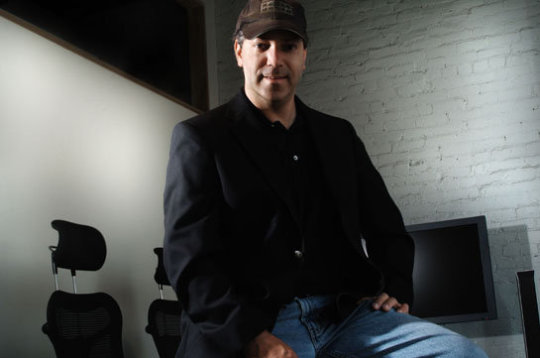
Friday, December 21, the end of the week before Christmas. I had a light workload so decided to start the day off by soaking in some of the local Christmas vibes. The day ended... on an unexpected, though sweet, trip down memory lane.
Now usually I walk straight across the four blocks first thing in the morning from the UW Medical Center next to the Ballard bridge... to my bus stop on 15th & Market. On this morning, though, I lazed my way 4-5 blocks east, 7-8 blocks north, and then 4-5 blocks back to my stop. Along the way, I focused my full attention on the colors and shapes, the feel and the celebration of Christmastime the way the good folk down in Ballard celebrate it.




For the sake of a Facebook photo album, I called the experience Looking For Signs Of Christmas On A Friday Morning In Ballard... a thoroughly peaceful time of walking and observing and taking it all in one morning in December within sight of Christmas Day. If you click on the “Looking For Signs...” link, you’ll get a look at all the photographs I snapped whilst doing my Christmastime walkabout.
I still had work to do, though, so by ‘n by I made my way to the bus, to the UW, to my edit suite... where I finished up the work I was doing. A short day, I found myself with some time on the back end so I walked over to Suzzallo library and made myself comfortable in its reading room. Something I’d never done before.
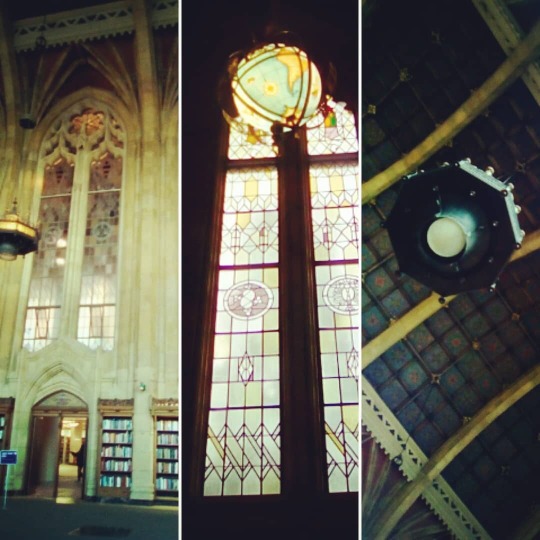
The reading “room” is actually more of a cathedral space with plenty of headroom and quiet to spare.
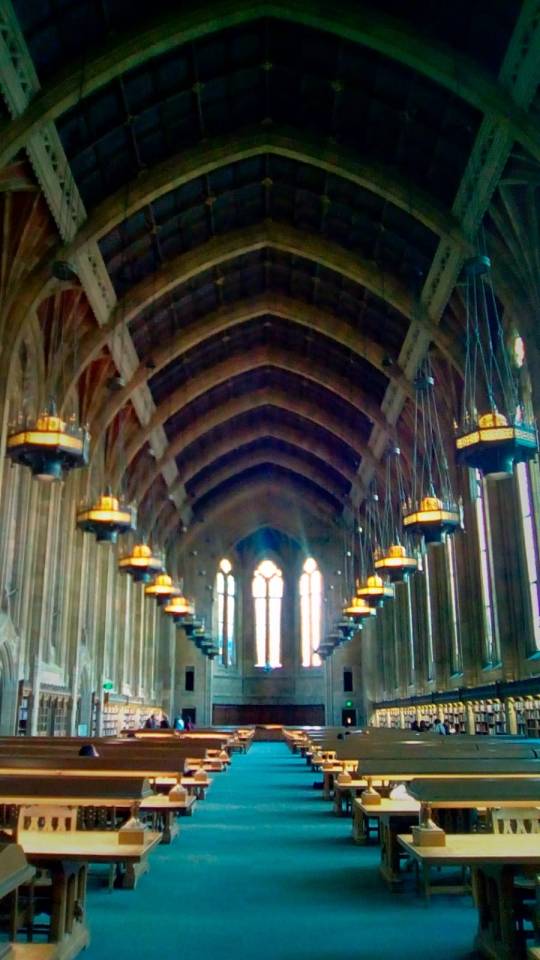
It didn’t take long, sitting there in contemplation, for me to realize how long it’d been since I was here. Not as a student, though, but as an associate producer (along with Kimmer) to this guy...
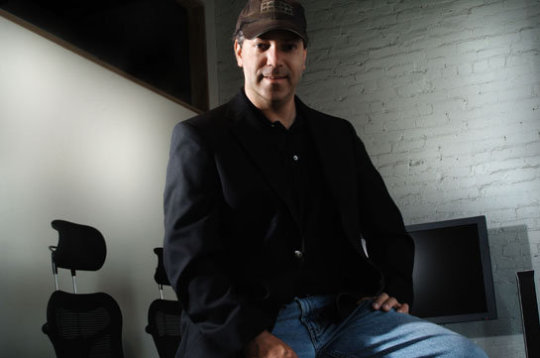
...Scott von Freiberg.
A fellow graduate of the Art Institute, Scott’s focus was always to be a film producer. And he had the whatever X-factor it was to get projects off the ground and crews together (sometimes on spec). He was great at pitching projects... and later I thought of him as a kind of Walt Disney. An idea guy. Someone with vision. The Big Picture.
So it’s 1993 and Scott successfully pitches the record company on an idea for a music video for one of their artists, Jack Wagner. At the time, Wagner was best known as an actor for his role on the soap opera General Hospital. He’d scored a Billboard #2 hit a decade earlier and released three albums since then. He had a new album slated for release and a song to kick it off “Girl It’s My Baby Too”.
Somehow Scott knew the record company was looking for a production company to translate that song onto film for VH-1 and, like I said, he pitched them and got the gig.
Which is where we came in.
As the numbers people.
You see, there was a definite budget... and Scott’s vision exceeded that hard and fast number. So instead of us being the bad guys saying “No!”... we left that job to one of the original Mac computers we set up in the middle of his apartment. Every idea he had was attached to a number that went into a spreadsheet contributing to a total. And our collective job was to wrangle Scott’s vision into that budget, a challenge involving both cutting costs and finding more bang for these bucks wherever we could.
Here’s how our collective efforts turned out...
youtube
And yes. The video’s very much a product of its decade. It may even be a kind of hold-out of the eighties. Definitely it’s a time-capsule.
A sweet reminder of Once Upon A Time with our dear friend, Scott.
No longer with us... but very much still in our hearts.
#Scott von Freiberg#Jack Wagner#Girl It's My Baby Too#Ballard#Christmas#Christmastime#Holiday Season#Peace#Theatrix Moving Pictures#Market Media#Relaxation#Memories#Good Times#Suzzallo Library#Suzzallo Reading Room
0 notes
Photo
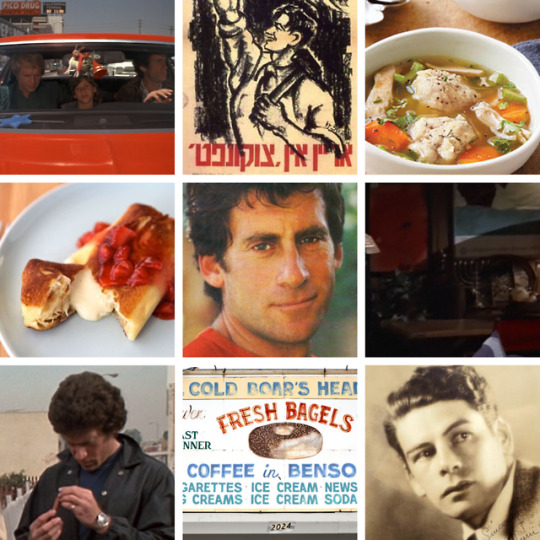
Starsky is Canonically Jewish - A Moodboard & Analysis
A detailed exploration of all the Many Many aspects in the canon that point to Starsky being Jewish can be seen under the cut + bonus headcanons!
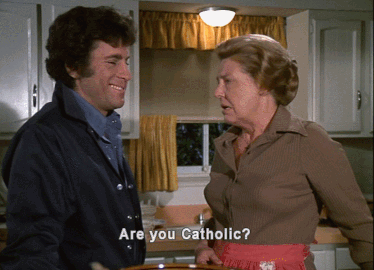
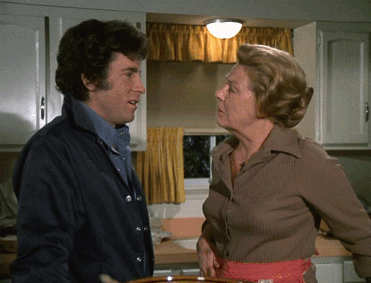
So I was looking at Starsky’s fanlore page and the discussion there talks about hints within the canon that Starsky may be Jewish. As one commentator notes, “There is plenty of mild justification for Starsky being Jewish”. Tbh, I’d say that, whilst subtle and never explicitly addressed, there is far more than just mild justification to suggest that Starsky is Jewish, and that he is in fact canonically so (and also I found the menorah they were talking about and I felt like I was on Myth-busters, which I’ve never seen but I imagine they mainly investigate fandom hearsay regarding background menorahs and other such suggestions. I’m insanely proud for having found it please appreciate because it took me a Very long time to, although I’ve found in researching this that there was at least one screenshot of it online here from 2011 :D).
TV Tropes has Starsky down for the Ambiguously Jewish trope and whilst I definitely agree that Starsky fits this trope description, I would say that there really is nothing ambiguous about it. There are just so so many aspects that come together. This boy is just canonically Jewish!
(Disclaimer: I’m not Jewish. Although I am very much considering converting and I’ve been studying everything I can about Judaism for well well over a year or so now, as well as attending services through whatever means I’ve been able to, I am by No Means even remotely close to being knowledgeable on the topic. Still, I figured there were some things I’d noticed whilst watching that hadn’t been mentioned that I wanted to bring up, and I also wanted to pull together observations by others into one place because I’m always hyped for canon representation and creating coherent resources. Extensive Research Is My Jam. If I’ve got anything wrong; said something in an uncomfortable way; talked where it wasn’t my place to talk; made assumptions I shouldn’t have; or like, said/done literally anything else that feels even slightly off then Please Please say and I’ll do everything I can to sort it!!)
Reasons why I reckon Starsky is canonically Jewish:
For one, Paul Michael Glaser is Jewish and if William Shatner being Jewish is good enough for my Jewish!Kirk headcanons then it’s sure as heck good enough for my Jewish!Starksy headcanons. Furthermore, according to Wikipedia, both Leonard Goldberg and Aaron Spelling are Jewish, and a good many of the writers have Jewish surnames too, though I can’t find out much about them specifically. Due to their fame, and therefore extended biographies, Wikipedia does specify that writers Michael Mann, and Fred Freiberger are Jewish. Joe Naar, who produced the show, was also Jewish, and used to joke that his style “was born out of being a short Jew with a huge chip on his shoulder.” Rick Edelstein was hugely involved in the writing of the later series and you can really see the influence Judaism has on his work, as is evident in his more recent short story, Bodega. He also ended his short video supporting Obama in '08 with "l'chaim, to life".
Essentially, I think Jewish people were involved in all levels of production within the show - from the writing, to the acting, to the direction, to the production - and this can be seen in the varied means by which it’s suggested that Starsky is Jewish himself. As such, suggestions that may have been seen as accidental otherwise can then take on greater significance, whilst the more explicit examples take on more emotional weight.
Why, then, would it not be more explicitly stated that Starsky is, and was always considered to be, Jewish? I read a really interesting post the other day about how Jewish people in Hollywood often felt unable to include Jewish characters/actors/themes in their work out of fear of seeming too “tribalistic, or insular, or that Hollywood was (as it was in the antisemitic imagination) a ‘Jewish’ front”. Obviously, I can’t comment from a Jewish perspective, but when I was younger I felt similar pressure in regards to including queer characters. As such, I think it’s really exciting to see the very explicit references to Starsky being Jewish, even if they aren’t clearly obvious to a wider audience not actively looking for such references.
Paul Michael Glaser also played Perchik in Fiddler on the Roof (1971) - which I mention not only because it shows Glaser playing other Jewish roles, but also as a recommendation because I Love My Hyped Wee Jewish Communist Revolutionary Boy. Glaser talked about how Starsky was a culmination of other characters he’d played prior to Starsky (DVD extras) and I think this is quite evident in Starsky and Perchik’s respective behaviours. As a nod to this, the middle top picture is (apparently) from a Jewish Labour Bund publication. This is something you can learn more about on its Wikipedia article here, and there’s more interesting things about The Bund here and here as well!
As we all know, Starsky calls Hutch the Blond Blintz (to his Puce Goose) :D Here’s a recipe for blintzes from myjewishlearning.com - they’re like pancakes and it’s an Ashkenazim custom to eat them on Shavuot. Also I love the scene in The Set-Up: part 1 where he first calls Hutch the Blond Blintz and Hutch is like???? and Starsky just says Blintz very definitively and with no further explanation and Hutch is just like,,, u kno what,, I’m just going to roll with this.)
I basically just really love this because it’s an example of Starsky being very openly and explicitly involved in Jewish culture, not just when he says it in The Set-Up, but also in Starsky’s Lady, when playing with the kids, especially as there aren’t a lot of references to things that carry on across multiple episodes.
I also like the way he pulls everyone else into his reference of it very un-apologetically; it feels very in character. There’s a picture of a blintz in the left column of the middle row! (Also, I feel like,,,, there might be some,,,, Freudian Implications to naming your partner after a rolled pancake filled with cream cheese that gets released when eaten?? @jimmyandthegiraffes fite me.)
Whilst Hutch looks at a glow in the dark cross being sold by Huggy in Jojo (written by Mann), Starsky picks up a mezuzah, which are put up at gateposts and door frames in Jewish homes - here’s a video about it :D The picture in the left-most bottom corner is Starsky inspecting this mezuzah. I really like this scene because he goes straight to it and seems to be considering it with very real interest. This is interestingly contrasted with Hutch picking up the cross, which isn’t the only time the show appears to draw a distinction between their respective cultural and religious heritages.
I think that really responds to some of the stuff William Blinn has said about their casting and how thrilled they were to have two actors playing characters from such different backgrounds whilst having such great chemistry, and how that really helps form the magic of the show even (DVD extras). I think their respective choices really help to demonstrate how assumed it was that Starsky Would naturally pick up a mezuzah, in contrast to Hutch’s cross.
The menorah (or actually Chanukkiah if we’re going to be really specific about it) in the background of Starsky’s apartment in Foxy Lady and in Blindfold. For so long I thought this was a myth but!! it’s not!!!! You can see it in the right hand column, middle row :D With the greatest thanks to the canon compendium for pointing out the episodes it appears in and also for like, literally everything else - it’s genuinely just the best fandom resource I’ve seen. I love this because I think, asides from a Magen David (Star of David), I think a menorah is one of the most well known symbols of Judaism and I think it’s really rad that it’s something the crew thought consciously to include, even if it is a largely not shown background detail. Again, it’s subtle but explicit which is why I would argue that Starsky is canonically Jewish.
It’s also worth remembering that even though it’s in an area in his apartment that doesn’t get shot by the cameras except on a few occasions, it Is a part of the apartment that’s Really visible from like, every direction and is right across from the front door. I’ve got another screenshot below from Blindfold that puts it more in context of where it is. I think this is really cool!! It’s obviously something he considers a big enough part of his life to keep on display year round and it’s something instantly recognisable and visible for anyone coming into his house (Foxy Lady came out on March 1st and Blindfold on October 21st, neither of which are around Chanukkah, if you’re going by episode air dates).
Speaking of the Magen David :D As can be seen in the episode Little Girl Lost, Starsky has a couple of blue six pointed stars on his dash under his Christmas decoration, as you can see in the top left hand corner of the mood board. I think this is really cool because Starsky is obviously very hyped for Christmas in this episode, hanging reindeer from his mirror and singing Christmas songs and being really hyped for presents, and this could be used to suggest that Oh No He Can’t Be Jewish He Likes Christmas, but not only does he only engage in secularised aspects of Christmas (in contrast to the nativity scene at Kiko’s house), there’s the very conscious inclusion of these stars. All the scenes in the car are set during Chanukkah, which ran from 16-24th December in 1976, and the stars are blue, which, along with white or silver, is often used for Chanukkah decorations and is traditionally associated with Judaism. Basically this remains in keeping with the subtle yet very conscious inclusion of Jewish symbolism, easily missed by those not thinking to look for it.
Also I know heaps of Jewish people that enjoy the secular aspects of Christmas, particularly if the holiday has meaning for their friends. In Starsky’s case this might be more because he wants to annoy Hutch and he likes bickering or perhaps because he’s upset by Hutch’s increasing cynicism and wants Hutch to feel happier. Or because he wants a new caboose for his train set. Probably that.
In the bottom left hand corner you’ll see a picture of Paul Muni, born Frederich Meshilem Meier Weisenfreund, Meshilem being his Hebrew name. I just like that Hutch suggests Starsky’s mother called him Rudolph Valentino and Starsky corrects him saying she “said I was more of the Paul Muni type”, suggesting the actor she compared him to was actually a notably Jewish one (Paul Muni references can be found in Lady Blue, as written by Mann, and Silence). Again, I think the contrast between Hutch suggesting a gentile actor, and Starsky raising a Jewish one instead is interesting, as well as highlighting Starsky’s mother’s engagement with, and perhaps predisposition towards, Jewish culture.
On it’s own this is perhaps more of a curiosity, maybe too much opportunity for coincidence to really warrant too much attention, but Dobey also chooses a Jewish comparison in The Velvet Jungle when he says, “who do you think you are, Starsky, Milton Berle?” So here we have two instances wherein the comparisons drawn with Starsky are with other Jewish personalities.
In Terror On The Docks (written by Freiberger), Huggy apologises for not bringing an ill Starsky chicken soup, instead bringing mustard green broth which, “where I come from is just as effective”. This might not have much significance in and of itself, except that literally just 2 episodes later, in Shootout, Sammy Grovner makes a joke about chicken soup being Jewish penicillin. In addition, Huggy’s reference to his own culture’s cure-all suggests that chicken soup would have been the culturally appropriate first-choice for Starsky. As such, I’ve included a picture of matzo-ball chicken soup in the top left hand corner.
Also, in The Game, Hutch says in regards to their soup related upbringings that, “we obviously had different mothers” and Starsky says, “yeah, mine was chicken soup, yours was,, clam chowder”, which isn’t really that important except that the show likes to highlight their different cultural upbringings and once again they’re doing so by referencing something that is widely culturally understood to be Jewish, having already explicitly stated it within the show to be so. (I could write a whole dissertation about cultural soup references in Starsky and Hutch, but I’m not going to. Just note that there are a weird amount of them.)
We see in Running that Starsky calls his mother every Friday evening. I think this is really interesting because, if they were both observant orthodox, they wouldn’t be using electricity on Shabbat. I mean, duh, Starsky is Not observantly orthodox but this scene shows that neither is his mother. Any yet, the time they’ve picked to talk each week is on Friday evenings, when many Jewish families come together for Shabbat dinner. As such, I think this shows how Starsky’s Judaism holds a place within his life and his routines, as well as suggesting what tradition he may have been brought up in. I personally headcanon conservative, but Reform works too!
As the fanlore page says, “Starsky looked stunned when Nancy's mother asked him if he were Catholic in 'Terror on the Docks,' to which he replied he was not.” This scene is a really interesting one to watch for this (and, again, was written by Freiberger), and whilst this merely shows that he’s not Catholic, his confusion and bafflement suggests just how surprising this question is to him, and his discomfort is evident as he laughs awkwardly. I think this is an experience many minorities can attest to, and he’s feeling the unease that comes when you’re put under pressure to reveal a part of your identity that may well be not received well.
In terms of the canon, I think the way in which this is played is so in line with the concept that Starsky is Jewish that it really suggests that this was something in clearly in mind in regards to his characterisation, at least by a number of the people working on the show.
In terms of headcanons, I like Starsky’s bewilderment here because it seems like he straight up just thought it was obvious that he was Jewish, and so it offers an in-universe explanation for why he never says “I’m Jewish”, rather than the external explanation regarding the fears surrounding creating explicitly clear Jewish characters in the 1970s.
It is interesting, in universe, that he doesn’t then say, “No, Mrs. Blake, I’m afraid I’m Jewish”, but I think this shows Starsky’s reticence to talk about his background with strangers, despite his comfort proudly talking about blintzes with Hutch and Terry. This is frankly just understandable, given the existence of antisemitism and Mrs Blake’s evangelical Catholicism, and again offers another explanation for why he never says I’m Jewish, wherein everyone he feels comfortable knowing already know, so there’s no need for him to say that.
(This said, @jimmyandthegiraffes and I headcanon that he just explains everything he doesn’t know with the fact he’s Jewish, even when it’s totally unrelated, *queue Starsky’s sage voice* “Ah see, I wouldn’t know whether those out of date eggs are safe to eat because I’m Jewish.” - Hutch is going to throw something. Also saying he can’t eat something healthy Hutch has made because it’s not kosher, whilst eating something obviously treif, which I made a post about here.)
We also see Starsky’s reticence to talk about his background with antagonistic strangers/suspects in The Committee, “Starsky? What is it, Polish?” “Something like that.” And yet, in Starsky And Hutch Are Guilty we see Starsky talk with Sharon, with whom he obviously feels comfortable with, about his home cooked goulash, “My mother gave me a recipe straight from the old country.” Again, this shows an in universe explanation for why we never see Starsky talk about his background explicitly, as those who he feels comfortable knowing already know.
This line is also interesting as it suggests information about Starsky’s heritage that pretty clearly implies a family with an immigrant background; this again would be in line with the experience of many Jewish people in the US, particularly when considering Starsky’s roots in New York as many families settled there fleeing pogroms and persecution. I headcanon that Starsky’s father was killed just after his 13th birthday (and his Bar Mitzvah) and moved to Bay City the summer after (this is taking Glaser’s birthday as Starsky’s for consistency).
This would mean Starsky lived in New York 1943-1956. The Jewish population of New York was at its peak in 1950 at 2 million. Still today, New York City is the largest community of Jews in the world within a city proper, including Tel Aviv. I think it perhaps goes without saying that this was and is particularly true in Brooklyn. I’ve seen lots of fics argue about where about in New York Starsky is from (with one claiming New Jersey which was pretty left field). The closest connection to New York that I have is that I grew up on the outskirts of the city it was named after. If you ever want to visit York, it has a lot of chocolate museums and a nice Gothic cathedral and a bad connection with Jewish history. I’m on a tangent. My point is, although I can figure Yorkshire accents, I’m not especially good at figuring out the nuances of New York accents so I leave it up to you lot, and on the whole people tend to suggest that he has a Brooklyn accent. We also know he has swum at Coney Island, and that the sea there tastes better than on the playboy island (Murder on Voodoo Island: part 2).
What we do know is that Starsky grew up on 84th Street (Targets Without A Badge: part 2) although there do seem to be a Lot of 84th streets in New York. We also know that if we are agreeing on Brooklyn then 84th street runs through Bay Ridge, Dyker Heights, and Bensonhurt. I figure Bensonhurst works best because, even though it’s a very Italian neighbourhood now, until the 50s it was a Jewish/Italian neighbourhood, which works with Starsky’s grandmother’s flat above the Italian restaurant (Shootout). It also works with the implications surrounding Starsky’s family and the mob (The Set-Up: part 1) as the Bath Avenue Crew operated in Bensonhurst. The mob thing is also interesting when considering Starsky’s Jewish heritage. There’s a painted Bensonhurst shop front in the bottom middle of the mood board which has been kept the same since the 1950s when Starsky could have been living there!
This has all been largely (or wholly) tangential, but essentially my point is that what we know of Starsky’s heritage chimes pretty neatly with the experience of many Jewish Americans, which again ties in with the argument that Starsky’s Judaism was something held in mind by those involved in the creation of the show.
Another thing I found interesting was in an article I was reading about Paul Simon, born less than two years before Glaser. In regard to Simon, Donald Fagen says, “There’s a certain kind of New York Jew, [...] almost a stereotype, really, to whom music and baseball are very important. I think it has to do with the parents. The parents are either immigrants or first-generation Americans who felt like outsiders, and assimilation was the key thought — they gravitated to black music and baseball looking for an alternative culture.” Simon responded to say that this wasn't too far from the truth. Obviously, Starsky enjoying baseball does not at all mean anything about him being Jewish, but it does fit in with his Jewish New York upbringing, from his father taking him to see the Yankees and him collecting baseball cards (Vendetta), to his enthusiasm with Pete (Little Girl Lost).
It is worth noting how this enthusiasm for baseball seems to be something that Starsky engages in far more than Hutch, which is interesting given Soul's history with the sport. (I feel like they definitely could have done more with the fact that David Soul was a good enough player to be offered a contract with the Chicago White Sox). Perhaps this wasn't pursued because a passion for baseball was thought to be more in line with Starsky's upbringing, versus Hutch's Sea Scouts. Again, this maybe suggests a certain narrative held in mind regarding Starsky’s background and how it influenced his characterisation.
Curiously, any Yiddish on the show is typically said by Hutch rather than by Starsky. In Vendetta, Hutch says to Artie Sorkin, “Fagin, faigeleh. What’s the differences? You’re vermin.” Faigeleh meaning homosexual. Also, as the canon compendium notes, “Hutch calls his houseplant ‘Meschugah Mantherlus.’” ‘Meschugah’ means crazy in Yiddish. “‘Mantherlus’ doesn’t translate as anything but is probably an inside joke and supposed to sound Latin.” (Ballad for a Blue Lady, co-written by Glaser.)
Largely I just found this interesting, but I did read a really cool study talking about the use of Yiddish in the American vernacular and one of its many findings was that gentiles with close Jewish friends were, unsurprisingly, more likely to use more Yiddish terminology. Also, unrelated but super fascinating, LGBT+ people were more likely to use Yiddish too.
On the Jewish immigrant experience, in Partners Starsky tries to get Hutch to play Pinochle with him, claiming "you love Pinochle", suggesting this is a game they frequently play together. Pinochle used to be a favourite card game of Jewish and Irish immigrants. I get that at this point I'm probably clasping at straws but I'm going for as comprehensive as possible, and I think it creates a good story about Starsky playing it with his family and later teaching it to Hutch.
It is interesting how Hutch is possibly shown to be engaging with Jewish culture in regard to both his use of Yiddish and his love of Pinochle. This may well be because Jewish culture permeates American society, after all it's Soul we see say the Yiddish "putz" in the bloopers. But it is slightly interesting that these were lines given to Hutch, perhaps for plot purposes, or because the writers were choosing to include their own culture and ways of speaking in a way that is safer through the evidently gentile Soul rather than the conspicuously Jewish Glaser.
There are other instances of Judaism in Starsky and Hutch that aren’t necessarily pointing to Starsky being Jewish but that are notable. Huggy Bear and the Turkey starts with Starsky and Hutch undercover in Caplan Laundry, where Hutch seems to be undercover as an orthodox Jewish man (and Starsky his wife? Seemingly? They certainly uh, go for it in the bloopers).
Caplan/Kaplan is a surname found in a number of cultures but it is a common Ashkenazim surname which also makes me headcanon Officer Minnie Kaplan as Jewish because we all want more Jewish headcanons in our lives and I think it puts her friendship with Starsky in an interesting context. (Marki Bey more like Marki Bae)
Again, it's Hutch we see taking on the more visibly Jewish role, although this does not go to negate Starsky's own Jewishness, as this may well be understood to be his influence on the friend he spends significantly more than 75% of his time with. Also, it can be assumed that Starsky is undercover as a Jewish woman as he appears to work at the launderette.
Obviously A Body Worth Guarding is the episode that deals most with Judaism as the Jewish protesters are a central plot feature. It’s interesting that Starsky’s involvement with them is largely hostile, however, I think this is more to do with the circumstances. At first he believes they’ve hired muscle to hurt Anna so he goes in hard which means the Jewish Organisation for Action respond with a more hostile approach. And yet, he’s completely on-board with dropping the JOA lead and following the fascist one as a result of Kauffman’s logic that attacking Anna would only lead to more antisemitism, which despite being a sound argument had no actual evidence to support it. From this point Kauffman is still resistant to working with Starsky which means Starsky maybe is more heavy handed in his approach, but it is on order to get Kauffman to help him follow the fascist lead. Once the job has been done he seems a lot softer towards the JOA and genuinely thankful for their help.
Essentially, the episode is noteworthy but Starsky’s reaction to the JOA tells us not so much about his own personal beliefs and upbringing and more about how he approaches his job. I do think it interesting that he believes Kauffman’s logic and subsequently drops all suspicion of the JOA and instead trusts him enough to bring him in as help.
Also Huggy calls the JOA the “desert people” which might just be Huggy’s turn of phrase but I think it feels more comfortable if Starsky is Jewish as it’s more like banter between friends then.
In spite of all these very purposeful allusions and references to Starsky’s Judaism, in Savage Sunday he complains about having to work on a Sunday, the Christian sabbath instead of Judaism’s Shabbat. And yet, I don’t believe this undermines Starsky’s Jewish presentation as it seems that his complaints are more that he expects to have Sunday off because he is in a Christian society which usually allows him a break on a Sunday to which he can look forward to. When he’s complaining about working on a Saturday in Jojo (written by Mann), Hutch says, “Could be worse, could be Sunday”, to which Starsky replies, “Come on, Saturday’s bad enough”, bemoaning all the sports that he could be watching instead.
This is interesting too as you could easily use this to headcanon him using sport as an excuse to express his frustrations at having to work on Shabbat, especially as it’s Hutch who says, “Could be worse, could be Sunday.”
Note: It was mentioned on the fanlore page that Huggy gives Starsky a wreath of garlic ‘for those of other persuasions’, but, as far as I can tell, the garlic is to ward off vampires of “all the rest of the denominations” when the cross for “any vampire of Christian persuasion” won’t be of help, rather than the garlic being for non-Christian vampire hunters. As always, I’m loving Huggy’s enterprising approach to religion, making sure he covers all bases, but it’s not really a suggestion that Starsky is Jewish, just that he needs to protect himself from non-Christian vampires.
In the same vein, Huggy does say “Shalom” to Starksy (and to Hutch) in Dandruff, though this seems to be more as an aspect of his undercover role as Prince Nairobi.
Essentially, Starsky is frequently presented as engaging with Jewish culture, practices, and traditions, often very visibly so. Aside from the very explicitly Jewish references, Starsky is very frequently characterised in a way that suggests his being Jewish was held in mind, on a writing level, an acting level, a direction level, and a production level. As I mentioned earlier, American society in imbued with Jewish culture and so many of these things may have been purely incidental. However, coupled with the more explicit examples of Starsky's Judaism they may be said to take on greater purpose and subsequent significance. Pretty much across the board, he is understood to be Jewish and whilst these references maybe subtle enough to pass by those not engaged with Judaism or considering it a possibility, this does not preclude Starsky’s Judaism from being a very knowing and explicit inclusion, and therefore canon.
Given all this, I have some headcanons about to what extent Starsky is practising!
We canonically know he doesn’t keep kosher – I mean this boy eats linguine with clams. I have read a fic where Hutch is forbidden from telling Starsky’s ma that he eats bacon or meat with dairy and I really like this as a headcanon. I definitely think she Knows but she lets Starsky pretend he doesn’t because it keeps him happy.
We also know neither he nor his mother have qualms about not being shomer Shabbos, but as I mentioned earlier, we Do see them using Friday evenings as the time they choose to call one another.
We know he doesn’t wear a kippah on the regular, too. And he never says the Sh’ma out loud if he thinks he’s about to die, although I do think he probably says it to himself. Again, I think I’ve read a fic about that. As I reread the ones I have bookmarked I’ll add them in if I can find them.
Other than these examples, pretty much everything else as far as I can tell is fair game, particularly if you’re considering along the lines of Reform, or even conservative, depending on the community. I know a lot of Jewish people who would consider themselves to be actively practicing who don’t keep kosher or who work on a Saturday etc.
About that, as I mentioned above, we know he does sometimes work on a Saturday (and he complains about it). This suggests that he doesn’t necessarily frequent synagogue regularly, particularly as he was frustrated about missing the sport he likes to watch on a Saturday.
However, for one thing, this doesn’t mean he Never goes to temple, and for another, we do know that Starsky very likely celebrates Chanukkah, due to his Chanukkiah. Chanukkah is a relatively minor Jewish holiday and so if he celebrates this it’s likely he also celebrates other, more significant holidays, and high holy days. Maybe he doesn’t go to shul every week, but a synagogue on Yom Kippur is generally full of people who are not regular attenders.
Please imagine this boy trying to fast I bet Hutch would be glad as hell that Starsky isn’t at work lol.
Personally, I tend to headcanon that Starsky moves to greater observance post Sweet Revenge. I think the hospital rabbi is good at playing Pinochle and the two become friends and they have good philosophical debates and Hutch joins in and after Starsky is discharged they want to see the rabbi so they start regularly attending shul and they both find something they can get out of it, especially as I headcanon that they retire from the force I think it gives them a community. For Starsky, I think it gives him a connection to his heritage and his family and maybe his father in particular, as well as a focus on social justice work through the synagogue so that he and Hutch can still feel like they’re making a difference. Tbh, I think that Hutch might find a lot to connect to in Judaism, maybe in the way it’s focused on making a difference in the here and now and not in order to access some afterlife. To be clear, I don’t think that’s necessarily the angle Christianity takes but I think it is how Hutch might perceive it and I think he might find Judaism more grounding in that respect. Also, if he converts then Starsky’s ma would be thrilled that if he hasn’t found a nice Jewish girl then at least he’s found a nice Jewish boy and Starsky will tease that Hutch’s hair is so long he might as well be a girl. I think it would create a really interesting relationship between Starsky’s ma and Hutch where they talk about Judaism and she introduces him to recipes and books and stuff and later Hutch is showing Starsky and he’s like, how come Ma never showed me?! And Hutch is like, she tried to idiot you just got distracted. And they can just, explore stuff together. It’s really soft.
Also, I think they host Shabbat dinners every Friday and it’s really cool because it’s a way that they can stay in touch with the Dobeys after they’ve left the force, and how they can stay close with Huggy when they’re not visiting for tips every other day. Also Kiko and Pete can come and then stay the night and spend Saturday with them maybe to give Mrs. Ramos a break. Minnie can come too and say the prayers!! Plus Paco Ortega and Joey and tbh any number of the other kids they’ve accidentally adopted over the years.
Pesach at theirs is just, the fullest house you can possibly imagine I love it. @jimmyandthegiraffes came up with the idea that there isn’t space for Dobey and the boys are like, oh you’re sat on the counter and he’s like? But there’s an empty chair and place set out here?? And he goes to sit down and everyone is like, nOOoO that’s for Elijah!! You cAnt sIT in Elijah’S plaCe?!
Gosh I love them
Starsky high key calls the new year “secular Rosh Hashanah”
Even though I personally headcanon a greater observance after sweet revenge, there really is nothing at all to say he isn’t at least somewhat practising over the course of the series and even that he is, given the Chanukkiah and what that means about holidays. I like how he keeps it up year round to maybe keep in mind his faith/upbringing/background.
I think it’s interesting that many of the fics that engage with Starsky as Jewish often suggest that he’s not religious, which is of course completely possible. However, just because he doesn’t ever talk about a faith in God doesn’t mean it isn’t present, especially when faith is often something so private and proselytising isn’t a part of Judaism. Personally I think that Starsky does have faith in God throughout the series and after, and this does impact his relationship with Judaism prior to Sweet Revenge as he considers things like the mezuzah and engages with Jewish culture, but that it’s after Sweet Revenge that he starts engaging with his faith more as connected to Judaism and religious traditions, rather than I’m going to celebrate my culture and upbringing and also I have a faith in God. He sees the two as more connected perhaps? and his faith as having a more direct impact on his life.
I really like how Huggy says the thing about the chicken soup too, and the “desert people” line is made a lot sweeter by thinking of him as a cool supportive friend who Starsky has known for a long time and who typically engages with Judaism specifically because it means something to Starsky.
I seemingly have a lot of thoughts on this.
Also, I really like how he calls him blintz, weird Freudian implications aside, especially because blintzes can be eaten at any time but are typically associated with Shavuot and I like the idea that Starsky has really a really fond association with his religion but also with Hutch. I really like the idea that if Hutch converts then the two can stay up all night together, eating blintzes and cheese and Hutch can maybe read aloud for my dyslexic boy.
Essentially, I just really love thinking about this and I think there’s more space for an actively practising Starsky than there’s generally understood to be, religious or not, even over the course of the show. Especially if you consider Reform Judaism. But tbh just give me Jewish!Starsky fics and I’m happy whatever they’re like.
I’ve worked really hard to find each scene I’ve mentioned on my DVDs (this post has taken me literally So Long to write (9 months-ish? it’s my Child) and I’ve researched it far Far more than I do my uni assignments whoops), so you can be sure I’ve checked to make sure each reference is legitimate. If you want to see screenshots of these quotations, or you want to know whereabouts in the episodes they occur, then message me! If you have additional examples or you disagree with me or if you’ve spotted a mistake then share that too!
With all my thanks to my partner Chester who’s put up with me banging on about this and spending Hours and Hours being ridiculously pedantic in the hopes of creating as coherent a resource as I can. They’ve also contributed so much and just they’re rad. I also cannot thank enough the canon compendium for helping me fill in all the blanks and pointing me in all the directions I needed to go in, I Genuinely cannot think of a better fandom resource. Also the first 3 seasons scripts are available here which is a huge help.
tldr; Starsky is irrefutably, canonically Jewish and also I love him
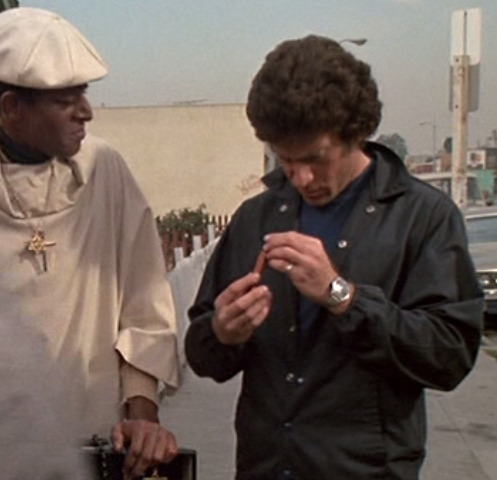
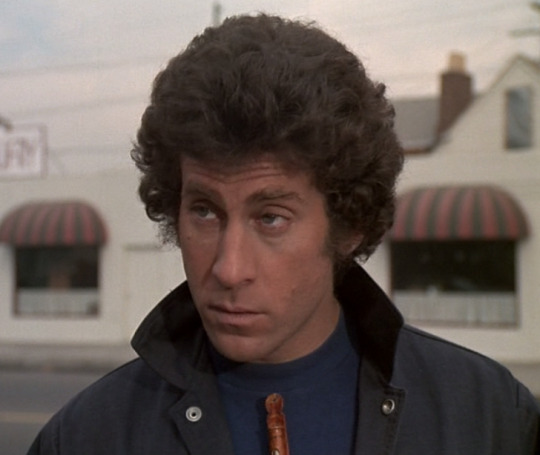
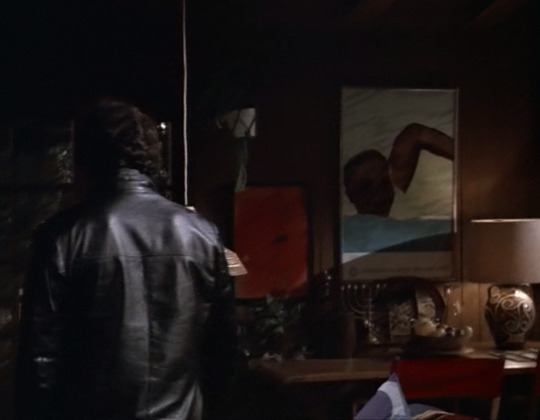
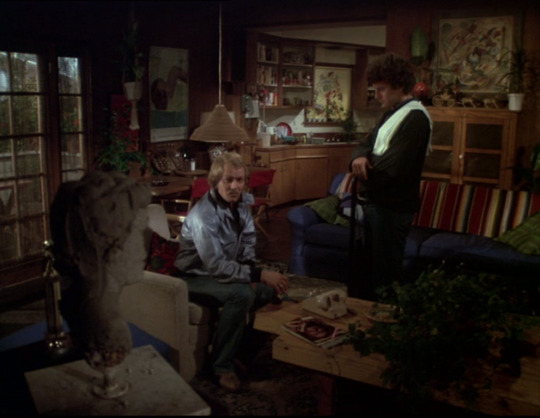
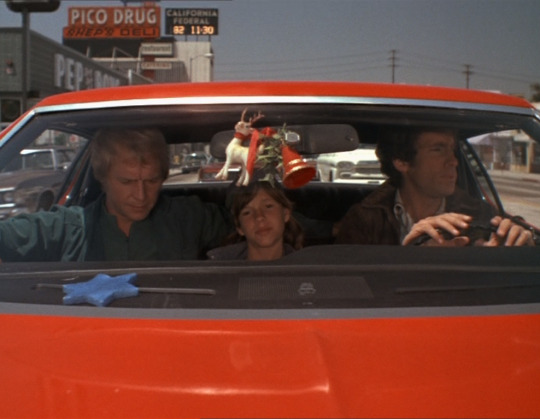
#starsky and hutch#starsky#david starsky#dave starsky#a jewish boy#this took like#9 months#starsky is jewish#this is over 6000 words whoops#my posts
89 notes
·
View notes
Text
Can anyone who bought Micky Dolenz's new book confirm/deny if Monkee girls like Ann Moses, Jan Freeman, Rochelle Reed, etc can be seen somewhere in the photos by chance? And while I'm here, since it's been over a year, can someone who has the Byrds book '1964-1967' also share if ladies like Anya Butler and Julia Dreyer/Girl Freiberg are spotted in any of the pics too? I know no one cares about groupie/muse/girlfriend part of rock fandom anymore, but part of me is still hoping some rare images of these girls pop up one day, lol.
5 notes
·
View notes
Photo
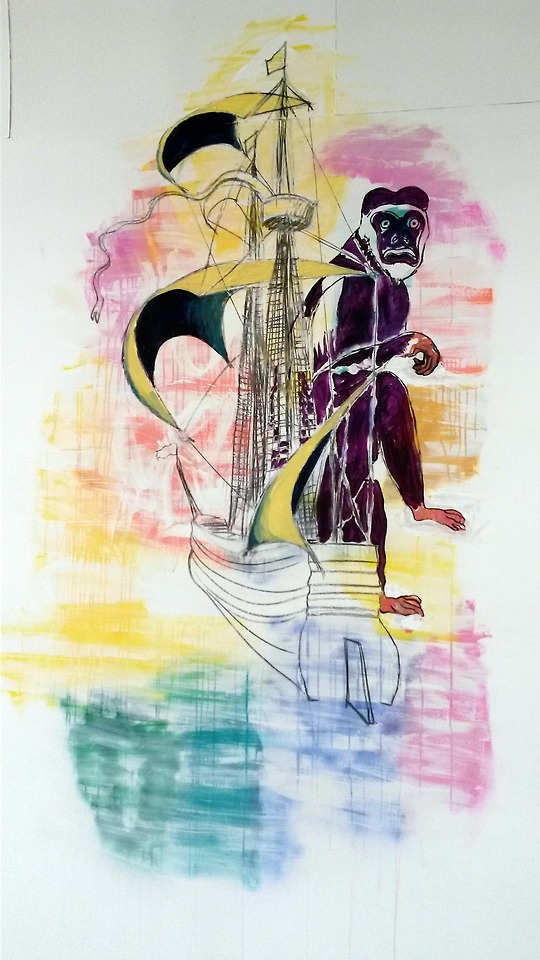
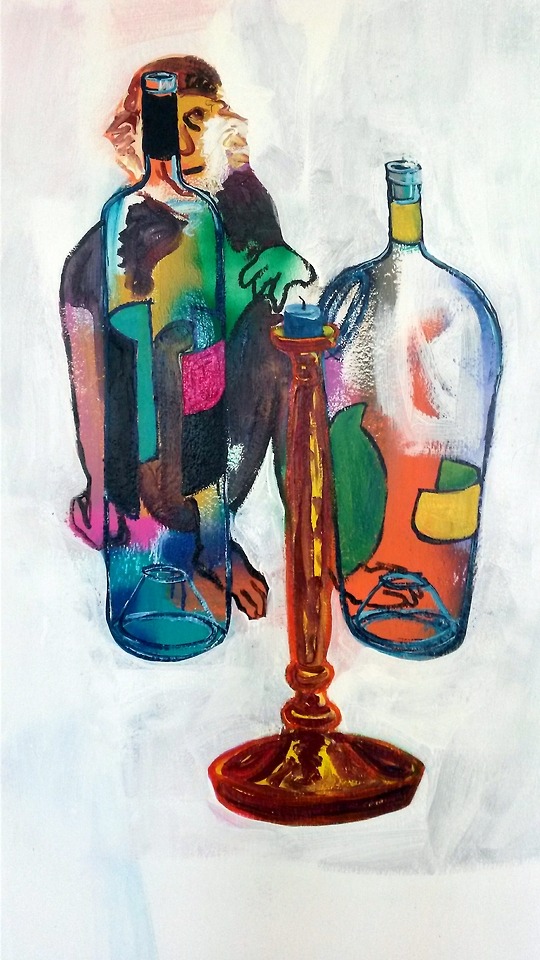
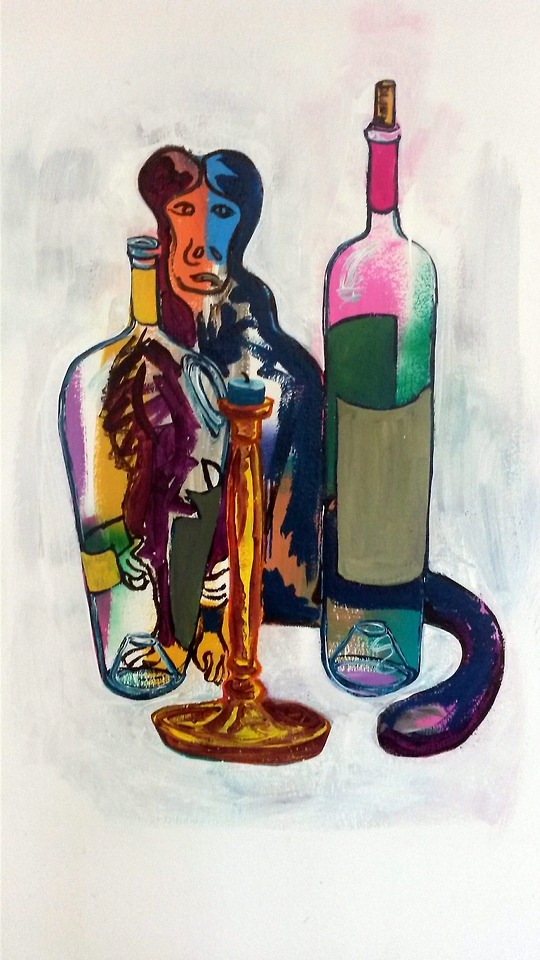
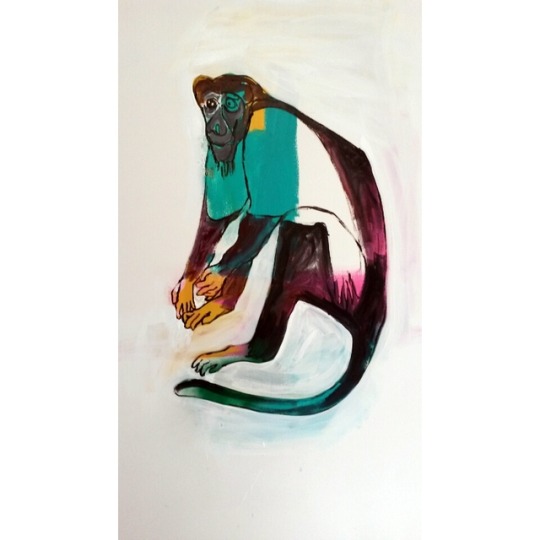
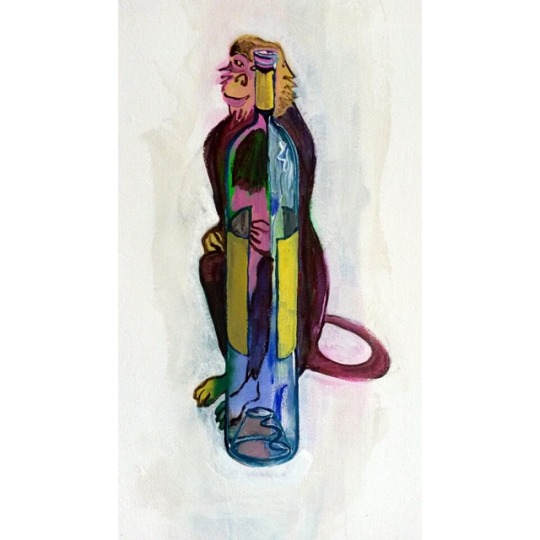
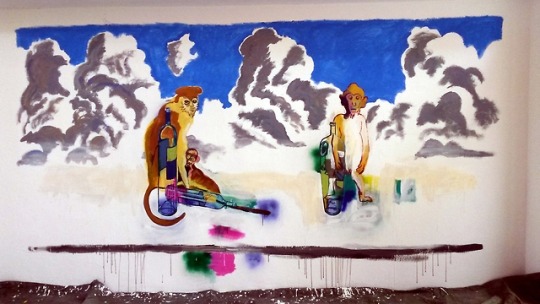
Photos of some of my murals in Galerie Na shledanou in Volyně, Czech Republic. … the show is up till mid-October
Also the interview in Czech and English that I made with the curator, Jan Freiberg:
Co tě přivedlo do Čech a co Tě tady (kromě rodiny) drží dnes?
I came to CZ in the first wave of Americans in the early 90s. I wanted to find a romantic life in Europe and it was an easy way to feel that I had “done something with my life” by simply moving far away. In the beginning the economic aspects were also appealing that everything seemed cheaper, but after living on the low salary available here, the economic reality also becomes a trap and keeps me here to some degree. On the brighter side it is true that CZ is a beautiful country with good health care and public transportation. There are many social democratic advantages in comparison with the USA.
Do Čech jsem přišel s první vlnou Američanů na začátku 90. let. Hledal jsem v Evropě romantický život a tím, že jsem se přestěhoval hodně daleko jsem měl aspoň pocit že jsem „něco se svým životem udělal“. Na začátku bylo také velmi přitažlivé, že se všechno zdálo levnější, ale poté, co člověk žije z malého platu je ekonomická realita jako past a to je také to, co mě tady do jisté míry drží. Tou lepší stránkou je, že Čechy jsou krásná země, s dobrou zdravotní péčí a veřejnou dopravou. V porovnání s Amerikou je zde mnoho sociálních demokratických výhod.
Pocházíš z rodiny s velkými kulturními kořeny. Mohl bys popsat některé hlavní osobnosti a co tě s nimi spojuje?
My mother was a painter when she was younger and I grew up studying her art history books. My father is a writer .. so I sought to choose a creative path and art was easier to avoid competing directly with my dad. My stepmother was the niece of William Faulkner and so this example of a genius in my family circle, although I never met him as he died in 1962, made it seem possible to reach for something more than just a career. But in a way I gave up my American roots when I moved here .. this is the sacrifice of the one who leaves his homeland. Mississippi is the land of the Blues .. I guess that melancholy and struggle stays with me.
Moje matka byla v mládí malířkou a když jsem vyrůstal, studoval jsem si v jejích knihách o dějinách umění. Můj otec je spisovatel .. takže jsem se chtěl vydat tvůrčí cestou a ve výtvarném umění jsem se vyhnul tomu, abych se s ním měřil. Moje nevlastní matka / otcova druhá žena byla neteří Williama Faulknera. Příklad génia v rodinném kruhu, i když jsem ho nikdy nepotkal, protože zemřel v roce 1962, tak pro mě vytvářel zdání, že lze dosáhnout něčeho vyššího než jen chození do zaměstnání. Svým způsobem jsem se ale vzdal svých amerických kořenů, když jsem se sem přestěhoval .. pro toho, kdo opustí svou zem, je to oběť. Mississippi je zemí Blues .. Proto se mě asi melancholie a zápas nepouští.
Na svém facebooku je vidět, že politické dění sleduješ přes americká média a vyjadřuješ se k nim z pozice Američana. Možná díky socialnim sítím žiješ mentálně ve spojení se svou domovskou kulturou a politikou než s tou českou. Co si o tom myslíš a jak vnímáš malé evropské měřítko?
It's difficult for me to be fully Czech and I hold myself at a distance. My Czech language ability is still, after many years, pretty bad .. so yes you are right about Facebook .. but I need to turn it off. I had hoped CZ would develop more quickly .. I shared in the dream of Havel and I didn't understand the way people in the East and West still support an Iron Curtain culturally even some 30 years almost after it's gone.
Je těžké být Čechem naplno a tak se držím stranou. Moje znalost češtiny je po mnoha letech stále mizerná .. takže ano, s Facebookem máš pravdu. .. měl bych ho vypnout. Doufal jsem, že Čechy se rozvinou rychleji. .. jako jiní jsem věřil v Havlův sen a nerozuměl jsem, jakto že lidé na východě i na západě pořád udržují železnou oponu v kulturním slova smyslu, a to 30 let poté, co je pryč. 4.Jak se žije americkému malíři v Čechách?
I teach English and I translate. I make very little money from my painting. I am a romantic and a dreamer and I dont play the game of convincing rich collectors to choose my work. Again I was naïve in that I believed people had good taste and supported committed artists, when of course the reality of the “art market” is much more about status and superficial material concerns.
Učím angličtinu a překládám. Malováním vydělám jen velmi málo. Jsem romantik a snílek a nehraju hru na přesvědčování bohatých sběratelů, aby si vybrali mé dílo. Byl jsem naivní, když jsem věřil, že lidé mají vkus a podporují oddané umělce, přitom „umělecký trh“ je mnohem více založen na věhlasu a povrchních materiálních zájmech.
5.Jací umělci z amerických dějin jsou ti blízcí? V čem se liší tvé malířské kořeny od těch evropských?
From the previous generation I admire the work of Philip Guston and Wayne Thiebaud. I was in college in the mid-80s so the whole Neo-Expressionist movement affected me. My mark is naïve, on the border of art brut .. I work with my limitations and strengths, like any artist. I was quite inspired by the Georg Baselitz show at the Rudolfinum and to see the influence Guston had on his work. I like German and Italian painting and I would like to believe an American can participate in the cultural dialogue of Europe, even as it evolves. Lubos Typlt warned me that Czechs are more concerned with Conceptual Art instead of painting, which is dominated by Germany. Perhaps I would have had better luck in Germany .. who knows …
Z předchozí generace obdivuju dílo Philipa Gustona a Wayne Thiebauda. Na vysokou jsem chodil v polovině 80. let, takže mě ovlivnilo celé neo-expresionistické hnutí. Můj rukopis je naivní, na hranici art-brut .. Jako každý umělec, dělám, co umím. Udělala na mě dojem výstava Georga Baselitze v Rudolfinu a uvědomil jsem si vliv, jaký na jeho dílo měl Philip Guston. Líbí se mi německá a italská malba a rád bych věřil, že jako Američan se můžu podílet na kulturním dialogu Evropy. Luboš Typlt mě varoval, že Češi jsou více zatíženi na konceptuální umění spíše než na malbu, kterou zase ovládaji v Německu. Možná bych se byl uplatnil v Německu .. kdo ví ..
6.Konec večírku. To je název tvé výstavy v Galerii Na shledanou. Jak ho můžeme chápat?
The monkeys represent humanity, the empty bottles is our depleted environment. We are at a critical place in our relationship to technology and progress. I feel we are still little more than monkeys in our understanding of the world, and in fact the monkeys themselves are more connected to nature than we are. We take and take, but we don't give back to the world. The party (1945-2008, post-WWII reconstruction) is over .. what comes next? We need to have more respect for the world we live on because we are are on this planet together. We either live or die all together. The ship is a journey, we are all on a journey, but to where?
Opice představují lidskost, prázdné lahve jsou naše vyprázdněné životní prostředí. V našem vztahu k technice a pokroku se nacházíme v kritickém bodě. Mám pocit, že jsme jen o málo chytřejší než opice v tom, jak rozumíme světu, opice jsou dokonce s přírodou spjaté více než my. Pořád jen bereme, ale nic světu nevracíme. Večírek (1945 – 2008, poválečná rekonstrukce) skončil .. co bude dál? Ke světu, v němž žijeme, musíme mít větší respekt, protože jsme všichni na jedné lodi. Buď spolu budeme žít nebo spolu umřeme. Loď je cesta, všichni jsme na cestě, ale kam? 7.Je ti blízká tématika konce, smrti. Ve svých obrazech pracuješ někdy s atributy smrti. Co tě k tomu vede?
Still life painting in the classical sense of memento mori led me to the theme of death. Moving to CZ and seeing Renaissance and Baroque culture closely helped me feel the power of the symbolic still life. Also having my own child and getting older myself opened up this theme for me. Often the art market focuses on the energy of young artists, but what do they know of the world? I think after we live and see the world, we begin to understand what we can say in response to it.
Malba zátiší v klasickém duchu memento mori (pamatuj na smrt) mě přivedla k tématu smrti. Příchod do Čech a bližší seznámení se s renesanční a barokní kulturou mně daly pocítit sílu symbolického zátiší. Téma mi také otevřela otcovská zkušenost a stárnutí. Umělecký trh se často zaměřuje na energii mladých umělců, co ale ti vědí o světě? Myslím, že teprve když žijeme a zakoušíme svět, začínáme rozumět, co máme na něj odpovědět.
8.Často maluješ klasické zátiší. Které tradiční alegorické předměty používáš a které jsi na scénu přinesl sám a proč?
I answered this above, but I feel my addition of the monkeys as a mirror of the viewer .. a living presence among the objects. Still life painting reveals an inner psychic landscape, it's rich with association. As a small theatre stage, it also has its weaknesses.
Už jsem na to odpověděl výše, ale můj vlastní příspěvek pociťuju v opicích, které jsou jako zrcadlo diváka … živé bytosti mezi předměty. Zátiší odhaluje vnitřní psychickou krajinu, která může být bohatá na asociace. Jako malé divadelní jeviště má ale také svoje slabosti.
Měl bys chuť sám charakterizovat svou práci?
My work is a poetic response to my lived condition. Some aspects of my life as an immigrant are reflected in the monkeys who cannot speak, the emotional contact with faces and eyes.
Moje dílo je poetickou odpovědí na mou žitou zkušenost. Určitý aspekt mého života coby imigranta se zrcadlí v opicích, které neumí mluvit, v emočním kontaktu pomocí obličeje a očí.
Co Tě zaujalo ve Volyni?
I was quite drawn to the river Voltynka and the benches on both sides of the river .. the beautiful sunsets created dioramas of village life: families with baby carriages, girls smoking on the benches. The graveyard and the devotion of people coming to clean the graves is very touching. I saw one Italian name there on a grave, so even here a few outsiders among you.
Velice mě přitahovala řeka Volyňka s lavičkami na obou březích … krásný západ slunce vytvářel diorama života na venkově: rodiny s kočárky, dívky pokuřující na lavičkách. Hřbitov a velmi dojemná oddanost lidí, kteří sem přicházejí starat se o hroby. Na jednom hrobě jsem viděl italské jméno, takže i tady mezi vámi je alespoň jeden outsider. …
#art#contemporaryart#kunst#painting#mural#umeni#czech#artist#interview#volyne#jiznicechy#galerienashledanou
19 notes
·
View notes
Text
26. August 2021: Bettgeflüster in der Bubble Suite

Während des Schweiz-Aufenthaltes von Peter machen wir immer wieder mal ein paar besondere Reisen. Sei es mit einem Tagesticket mit der Bahn oder mit meinem kleinen Renault Captur. Dieses Mal planen wir eine Reise zur Tochter von Max, der 15 Jahre lang der Partner meiner Mama war. Silvia wohnt mit Hans Peter am wunderschönen Bielersee in Vinelz (ich wusste vorher auch nicht, wo das ist…). Da ich eine Freundin auf den fantastischen Malkurs der noch fantastischeren Aviva Gold (Protagonistin im Film „Paths of Life“ von Thomas Lüchinger) angefixt hatte fassten wir ins Auge, am letzten Tag der transformativen Malwoche im Waldhaus in Lützelflüh aufzutauchen, um die über 5 Tage gemalten Bilder zu betrachten. Das Hotel hatte keinen Platz für „Nicht-Kursbesucher“ und so machte ich mich auf Booking.com schlau, was es denn in der Umgebung im Emmental noch so geben würde. Ich wurde sofort auf das Bubble Hotel (im Thurgau gibt es eine ganze Reihe davon https://himmelbett.cloud/de/bubble-hotel.html ) aufmerksam. Diese Bubble Hotels im Thurgau sind aber immer ausgebucht oder ich bin immer zu spät mit der Idee… Da Peter ja ein absoluter Kuh-Fan ist fand ich dieses Bubble Hotel quasi mitten unter den Tieren besonders attraktiv und ich entschied, ihn damit zu überraschen.
Kaum hatte ich gebucht, erhielt ich die 9-seitige Informationsbroschüre und da stand drin, dass man die Dusche nicht benutzen dürfe, was ich etwas komisch fand. Ich schrieb also, dass am nächsten Tag noch etwas vor haben und unbedingt duschen müssen. Das wird dann auch bestätigt. Ich wusste: wenn wir Aviva und Ingeborg sehen, dann würde viel umarmt und wir wollten da nicht stinkend daherkommen. Die Erklärung wie man zur Bubble kommt klingt ziemlich abenteuerlich mit dem Code des Nummernschlosses, mit dem man das Gatter öffnen kann und der Anleitung, wie man den elektrischen Zaun zu öffnen und wieder zu schliessen hat.

Ich wollte mein Geheimnis ja für mich behalten und trotzdem sagte ich zu Peter: „Nimm dann auch ein Pijama mit auf die Reise“, was ihn extrem stutzig machte. Er wollte wissen, weshalb ich das sage bis ich abschwächte und sagte: nein, ich wollte dir nur einen Bären aufbinden – es ist alles ok. Und worauf ich ihm selber ein Pijama einpackte.Natürlich eins, das zu meinem passte.
Nach unserem Besuch in Neuchâtel, Vinelz, Erlach und Murten (wo Peter 2002 an der Expo im Zivilschutz als Seepolizist (ohne Schwimmen zu können) einen Einsatz hatte) machen wir uns auf den Weg ins Emmental. Kurz vor der Destination halte ich Peter die Broschüre hin und zeige ihm, wo wir die nächste Nacht verbringen werden. Mit dem Navi finden wir den Ort schnell. Das Problem ist nur, dass da ein Hund ganz böse bellt und aus dem Appenzellerland sind wir uns an Wadenbeisser gewohnt… Wir trauen uns also nicht auszusteigen, bis Pia, der der Hof gehört, Entwarnung gibt. Leika wurde früher geschlagen und daher reagiert sie mit Bellen – gut zu wissen… Peter behält aber ganz schön Respekt vor dem hübschen Hofhund.

Es ist noch ein Ehepaar mit Camper in der Nähe und sie zeigen uns das Bubble Zimmer, das eigentlich aus einem Gestänge mit einem Plastiküberzug besteht. Etwas weniger stabil, als ich mir das vorgestellt hatte. Da es ziemlich warm ist, hatte es auch eine ganze Menge Fliegen, worauf Peter ja recht allergisch ist. In Kenia killt er alle mit einer Riesendose „Doom“ bis ich auch fast wie eine tote Fliege bin wegen der giftigen Dämpfe. Aber hier liegt nur eine ganz gewöhnliche, mechanische Fliegenklatsche.
Ich kann jetzt nicht sagen, dass Peter einen totalen Begeisterungsschub hat. Er schwankt so zwischen: „was, hier sollen wir schlafen“ und „wo immer du hingehst folge ich dir“ hin und her. Ich selber amüsiere mich köstlich. Irgendwie finde ich es auch ein bisschen eine Revanche, da ich ja immer sage „I’m a city girl“ und dann doch 4 Monate in der absoluten Pampa in Kenia verbringe. Wir machen eine kurze Siesta während die Ziegen ihre Hörner an der Umrandung wetzen und uns klar wird, weshalb wir einen Zaun um das Bett haben. Er schützt uns vor den Ziegen und nicht umgekehrt.
Auch die Freiberger Pferde stolzieren um die Plattform herum und ich habe einen Heidenrespekt vor den Tieren. Aber Pia ruft immer wieder: die sind ganz lieb, die machen nichts, du darfst sie einfach nicht erschrecken…Später geht dann eine Gruppe los auf den Ziegen-Spaziergang, der hier zur Attraktion gehört. Zum frühen Abendessen haben wir mit einer Kuoni-Freundin abgemacht an einem wunderschönen Aussichtsort – leider ist an diesem Abend die Aussicht in einer ziemlichen Wolkenschicht eingepackt und wir müssen uns das Eiger/Mönch/Jungfrau Massiv im Hintergrund vorstellen. Aber der Abend geht mit vielen spannenden Themen sehr schnell vorbei und wir machen uns auf den Weg zurück in unser Bubble Hotel.
Peter schiebt ein bisschen Panik, da er meint, er würde erfrieren in dem Bett. Mir fällt ein, dass ich noch eine dicke Winterjacke im Auto habe und eine Wolldecke: mit beidem wickelt er sich ein und sieht aus wie auf einer Sibirien-Expedition, während mir ein T-Shirt und Leggings vollkommen genügen.

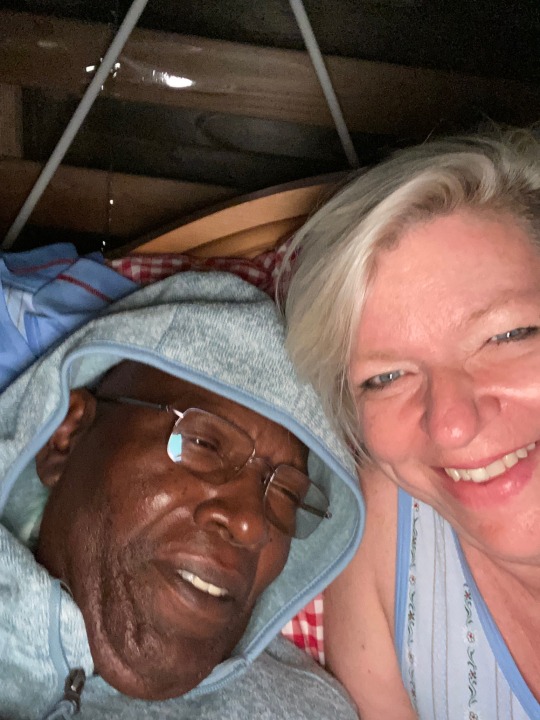
Da Peter ja ein absoluter Kuschler ist wendet er auch diese Nacht die Technik an, die mich normalerweise an den Rand des Bettes drängt. Da er selber wie ein riesiger Wollknäuel ist kriege ich einen solchen Hitzeschub, dass ich fast die Decke wegstrampeln muss. Er hat auch Angst, dass er nicht schlafen könne, wenn es nicht dunkel ist aber ich habe Beweisfotos, dass ihm das trotzdem gut gelungen ist. Was ich bei der Buchung auch nicht gecheckt hatte: es ist fast eine Vollmondnacht und es wird überhaupt nicht dunkel – ganz im Gegenteil: der Mond scheint voll in unsere Bubble und die Sterne zeigen sich auch noch.
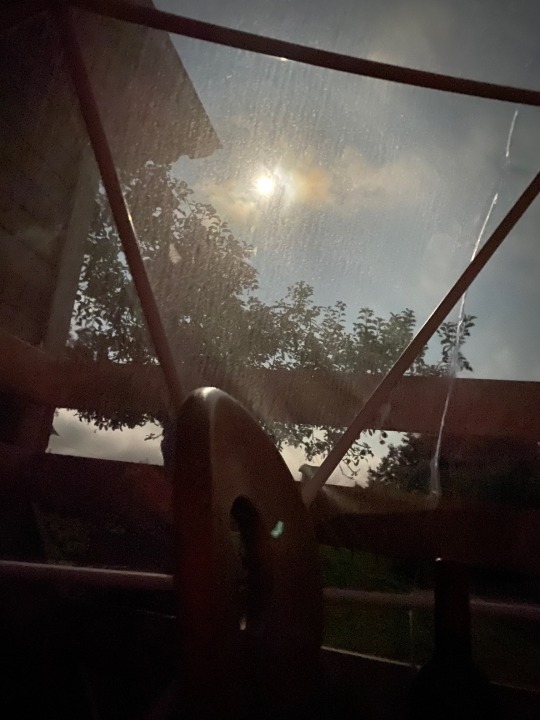
Was uns ziemlich oft vom Schlafen abhält sind aber die Pferde, die direkt neben uns im Schöpfli „schlafen“, bzw. hätten schlafen sollen. Sie bewegen sich oft und schlagen auch gegen die Wand und – das bringt uns mitten in der Nacht zum Lachen - die Viecher lassen sekundenlange Furze los und zwar schön abwechselnd. Zum Glück sind sie nicht zu riechen – ich glaube ich wäre in Ohnmacht gefallen. Aber so können wir das Lachen bei jedem pffffffffff nicht mehr zurückhalten.

Erstaunlicherweise fallen wir aber doch noch in einen Tiefschlaf nachdem wir uns zwei Gläser Rotwein gegönnt haben, die ich vorher noch organisiert hatte. Mit der Zeit freundet sich Peter dann doch mit der Situation an und am nächsten Morgen geniessen wir noch ein originelles Frühstück bei Pia. Originell, weil ich persönlich auf einem Emmentaler Bauernhof einen Käse, einen Kaffee mit Milch und frische Butter erwarten würde. Der Hof ist aber ein Lebenshof -für mich ein vollkommen neuer Begriff: https://piabuob.ch/. Das bedeutet, dass die Tiere weder geschlachtet noch (aus)genutzt werden. Also keine Milch, kein Fleisch, keine Butter, kein Käse. Ich lerne auf jeden Fall sehr viel in sehr kurzer Zeit. Der Hof finanziert sich durch Spenden und Gönner und wir erfahren viel über die Bauern in der Schweiz und dass immer mehr Bauernhöfe auf vegan umstellen. Pia ist auf jeden Fall eine herzensgute Frau, die ihre Tiere über alles liebt und sich oft für Tiere einsetzt damit sie ein würdiges Leben führen können und nicht auf der Schlachtbank landen.
Wenn du dieses Erlebnis auch einmal haben möchtest: https://erlebnis-unterkunft.ch/unterkuenfte/pias-hof/

Würde ich es wieder machen? Auf jeden Fall – einzig ein kleines Chübeli für den spontanen Toilettengang würde ich noch einschmuggeln. Wenn man so weit zum Klo gehen muss hat man nämlich dauernd das Gefühl, dass man „müsse“ – auch wenn es gar nicht der Fall ist. Es war definitiv weniger romantisch als ich mir das vorgestellt hatte aber ich gebe auch zu, dass ich noch selten so viel gelacht habe mit meinem Mann wie diese Nacht! Auf meine Frage: „would you do it again?“ ist seine Antwort: “let’s go again tomorrow” – das sagt ja schon alles aus…
P.S. die Kühe waren nirgends zu sehen, denn die waren grad an einem anderen Ort - eine Herde in Oberwangen in der Ostschweiz...
0 notes
Text
‘VIEWS FROM THE EDGE’ - w/c 21st September 2020
apologies, due to technical issues the first airing of the week on Mad Wasp Radio was ‘slightly’ transposed with part 2 playing first and then the the first 20 minutes repeating before part 1 started :-( can’t keep the gremlins away all the time. Still managed to include all the Kate Pierson tracks ;-)
The Ramones 'Chop Suey'
Siouxsie & the Banshees 'Hong Kong Garden'
Ms. Dynamite 'Judgement Day'
Iggy Pop & Kate Pierson 'Candy'
Nadine Shah 'Holiday Destination'
Prep 'Cheapest Flight'
Tat 'Taking It All' ELO 'All Over The World'
David Bowie 'China Girl'
Sasaki Saishin 'Silent Spring'
Emelie Autumn 'I Know Where You Sleep'
Cado Belle 'Stone's Throw From Nowhere'
Nina Simone 'See Line Woman'
Lil' Kim & Mya & Christina Aguilera & P!nk 'Lady Marmalade (Thunderpuss Radio Mix)' not TD1
Lisbee Stainton 'The Archives'
Anna Renae 'Far From Sanity'
Georgia Cécile 'Always Be Right For Me'
Tizane 'He Took It All Back'
Paul Kantner, Grace Slick, and David Freiberg 'Across The Board'
Jefferson Starship 'It's About Time'
The Fugees 'A Change Is Gonna Come (BBC session)'
The Velvet Underground & Nico 'All Tomorrow's Parties'
REM 'Shiny Happy People'
The B52s 'Roam'
Various Artists 'We Are Family'
Sly & the Family Stone 'Family Affair'
0 notes
Photo
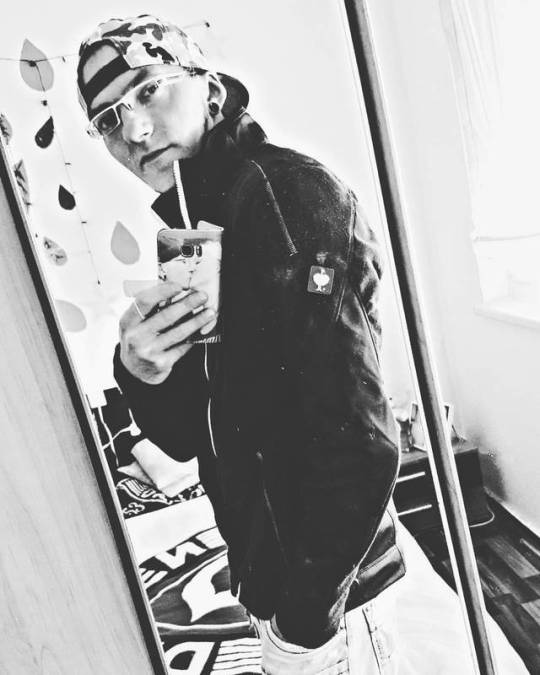
Deine Schwächen sind auch Stärken an dir gefällt mir alles gut Ich will dich nicht verletzen hab' nie verstanden, warum ich's tu Wir wählen Worte um uns zu streiten als wären wir uns nicht genug Zu oft vergessen wir zu sagen wie gut wir uns beide tun Good Morning Boys and Girls Have Nice Day #goodmorning#gutenmorgen#boysandgirls#haveaniceday#instafriends#instagood#instagramphotographie#instagram#blackandwhitephotography#blackandwhite#photographie#sonntag#wekeend#relaxing#chillen#isso#me#style#fashion#engelbertstrauss#zitat#sprüchezumnachdenken#sachsen#saxony#freiberg (hier: Freiberg, Sachsen, Germany)
#instafriends#instagramphotographie#wekeend#zitat#relaxing#sprüchezumnachdenken#blackandwhitephotography#fashion#instagram#engelbertstrauss#instagood#isso#saxony#boysandgirls#sonntag#me#haveaniceday#goodmorning#blackandwhite#style#photographie#sachsen#chillen#gutenmorgen#freiberg
1 note
·
View note
Text
Suspiria (Luca Guadagnino, 2018)
The object-in-resistance is the heroine of both the 1977 Dario Argento Suspiria and the semi-remake released last year. In each, “Suzy,” a dancer alone for the first time at a German conservatory, gracefully stumbles across an ancient coven of witches conspiring to consume the flesh and youth of the dance students in attendance. Rather than submit to consumption, Suzy uncovers the horrible plot and defeats the awful old cannibals.
Separation from humanity, the rendering unto objecthood, the distancing of the world-as-image from the world-as-lived, is the project of Argento’s Suspiria. Every element of the film is artificial, theatrical, cartoonish. Before her first dance class, one of the school’s instructors briefly curses Suzy. Jessica Harper, playing Suzy, wobbles unconvincingly in a mesmerized dance-like full body gesture before fainting outright in her dance class. Blood candy apple red dribbles out of her nose and mouth. The vivid color of the blood is matched in the fill lighting in darker scenes. The lighting is so theatrically mannered in these scenes, the three-strip Technicolor process used in the film’s production leaps out in front of the blood and dancers. When a supernatural infestation of maggots forces evacuation of the dorm, the girls are quartered in the school’s gym. The house lights go out, and the white sheets turn bright red, as if shining a flashlight through skin. Instead of black shadows, blue light creeps across faces and floors. Lighting a subject from two sides with a red and a blue source has in the last few years been called “bisexual lighting,” which is a lot of fun in music videos and sexy thrillers where a hero roams a neon cityscape equally-likely to contain lovers or killers. The effect on the subject is the eradication of skin tone, and the replacement of the light/dark dialectic in a less-stylish composition with a field of colors, each with its own light and shadow, sometimes entirely filling in the complementary color’s absence. In Suspiria, colorful lighting floats the characters in a soup of otherworldly non-shadows. Any color, no matter how bright, or shining at any angle, could be the darkness hiding a blood-thirsty witch.
The anamorphic wide screen lenses blur on the left and right edges of the frame. The wide angle lenses used are not rectilinear, but instead distort the patterned surfaces of the floors and walls, warping around the centrally-framed actors. The lenses “breathe,” which is to say that they gently shift composition when focus is pulled from background to foreground. The film’s notoriously dramatic zooms are a peculiarly-cinematic invention, now used almost exclusively as a deliberate reference to the aesthetic flexibility of ‘70s genre films. When Suzy and a psychiatrist played by Udo Kier sit outdoors on a beautiful windy day, the camera zooms between them into the reflection of the window on a building, where Dario Argento’s reflection is seen as he pokes his head out from behind the barrier that hides the camera itself.
Udo Kier’s voice is dubbed, as are all the voices, and all the sounds in the film. Kier’s voice double sounds nothing like his unmistakeable Kölner accent, but still manages to hilariously mispronounce the word “occult.” When a blind man is mauled to death by his own guide dog, the dog is poorly dubbed when he barks. Italian cinema at the time dubbed all voices, as a rule, but the effect here is specifically unsettling. Sound effects are mixed in a musical way, rather than indicating spatial qualities through echo or volume. A screech of terror seen ripping out of the mouth of a victim is heard as only a faint, brief gasp, hardly noticed beneath the spacey synthesizer score. A student is stalked through a periwinkle hallway to a completely silent soundtrack. No footsteps, no breathing, until she is brutally attacked with a straight razor. The sound of the razor clinking against the latch of the door separating the student from her attacker is louder than the clack of the heavy wooden crates she stacks to escape through a window. When she succeeds in crawling through the window, only to fall into a nest of razor wire, the rattle of the wire is indistinguishable from the hum of the drum machine in the score.
I saw Guadagnino’s 2018 film at the Music Box Theater in Chicago. The cavernous cinema’s decayed decor matched the dusty squalor of Guadagnino’s Berlin more so than the rococo splendor of Argento’s Freiberg. The Thom Yorke score barely registers after the sitcom theme song credit sequence at the beginning of the film, unlike the teeth-rattling 1977 Goblin score. The zooms are less shaky, the wide angle lenses less fisheye, and the Wizard of Oz-style Technicolor is replaced with what Guadagnino described as a “winter-inspired” Fassbinder color scheme of greys, browns and slates. The shadows are softer, as though it is raining even when it isn’t raining. This Suspiria is nearly 40 minutes longer than the original, and Guadagnino fills the time with witchy staff meetings, Baader-Meinhof news broadcasts, and Rendezvous d’Anna-like frigid urban wandering through a persistent foggy drizzle.
Rain has become more common in contemporary film and television as technology has made shooting on location and in inclement weather cheaper and easier. When rain was more scarce in cinema, people in love with movies felt differently about rain. Cinema transformed rain from a mundane phenomenon to an affective manifestation, to a much greater effect than in the era of Romantic literature. The power of cinema’s spectacle to reach into the viewer and alter feelings was greater than the spiritual reach of wind and rain. The flexibility of new technology has returned rain to the mundane.
As in Cold War, the political struggle and human suffering of the period mostly stay just out of view of the plot. The intent is possibly to ground a wild story in equally wild history, but succeeds mostly in reminding the audience that the stakes of these fantasies are simply lower than the incredible reality just on the other side of the window. Like Argento hiding in reflections on buildings and in taxi windows, Tilda Swinton peaks through one-way mirrors and listens through floorboards. Swinton also hides in bizarre double-cast roles under extraordinary latex make-up, where she is given away only by her unmistakeable voice, which holds onto a posh fragile nasality when the rest of her is obliterated by prosthetics. When the victims are crushed by invisible forces, CGI hematomae have replaced the theatrically-fake blood, while the rest of the bodily fluids appear as realistic as modern technology can achieve. Every flourish that conspicuously settled the original film in the fantastic has been substituted with careful, droning realism, except for the Jodorowsky-symmetrical choreography of the final ghoulish ceremonial bloodbath. Perhaps the most effective touch of realism is the way art school is depicted as not an academic or educational project, but a disappointing administrative slog intended only to produce content for donors and audiences. The film’s finale, in this context, feels less like a Lovecraftian summoning rite and more like the same empty spectacle, slavishly worshipping a ‘70s that never existed, that fills museum performance curation across the globe each summer. Guadagnino’s accomplishment, as it is, is to have shown line-by-line why solving historical art problems with money is a bad idea.
0 notes